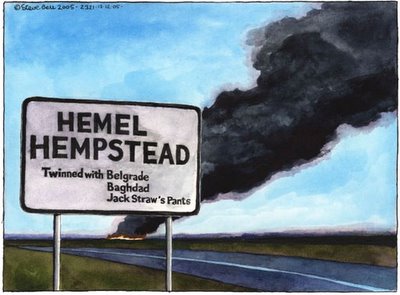Saturday, December 31, 2005
Alan Rusbridger is currently on holiday, but has said that it should have been covered in response to an email from Obsolete. Excuses apart, it's good to see that some editors will engage with us commoners.
Abolish the honours system.

It's Neo Year's Eve, so it's time once again for what we look forward to every year with baited breath: the new year's honours list. Or rather, for those of us who can't stand it, the yearly time to realise just how shit Britain and so many of its famous occupants are.
Heroes of the response to the July 7 London bombings, the victorious Ashes cricket team and the architects of the London Olympic bid dominate the new year's honours list, vividly reflecting the emotional lurches of a turbulent 12 months.
In the world of light entertainment there are knighthoods for veteran singer Tom Jones, for services to music, jazz musician Johnny Dankworth and a CBE for Bruce Forsyth, whose honour had been leaked to a national newspaper, with friends complaining he should have been knighted.
There will be a return to Buckingham Palace for Dame Vivienne Westwood, once the grande dame of anti-establishment fashion, who famously twirled for the cameras and revealed she was not wearing any knickers when she collected her OBE in 1992. Celebrity chefs Gordon Ramsay and Heston Blumenthal receive OBEs.
There is a gentlemen versus players divide in the England cricket team with OBEs for captain Michael Vaughan, coach Duncan Fletcher, and chairman of selectors David Graveney, while the 11 other players who helped regain the Ashes, including Andrew Flintoff and Kevin Pietersen, get MBEs.
Leading those honoured for the response to the bombings are Peter Hendy, the Transport for London managing director for buses, Tim O'Toole, managing director of London Underground and Julie Dent, chief executive at the South-west strategic health authority in London. They all receive CBEs.
MBEs go to David Boyce, the station supervisor who went into the tunnel at Russell Square tube station, John Boyle, first on the scene at London Aldgate and William Kilminster, a London Ambulance Service paramedic. "These people showed immense strength of spirit and courage in the face of terrorism on our transport system," said a Downing Street spokeswoman.
Lord Coe, the chairman of the London Olympic bid, is made a Knight Commander of the British Empire while knighthoods are given to Keith Mills, chief executive to the bid, and Craig Reedie, a member of the British Olympic Committee.
The inventor of the iPod and iMac, Jonathan Ive, the Newcastle-educated vice-president of industrial design at Apple, is given a CBE. In the field of the arts, the playwright Arnold Wesker is knighted while Robbie Coltrane, Imelda Staunton and Jeanette Winterson are all given OBEs.
Six other women are made dames - Julie Mellor, chair of the Equal Opportunities Commission; Liz Forgan, chair of the Heritage Lottery Fund and the Guardian Media Group's Scott Trust; Daphne Sheldrick, the conservationist; Averil Cameron, Professor of Byzantine history at Oxford University; Suzi Leather, chair of the Human Fertilisation Authority; Anna Hassan, head of Millfields community school, in Hackney, east London.
So let's get this straight: Tom Jones gets a knighthood for singing, Bruce Forsyth complains he doesn't get one for hosting crappy game shows and variety performances for god knows how long, and Gordon Ramsay gets an OBE for cooking and swearing while being filmed. Other than that, a group of people get honours for doing their jobs on 7/7, as opposed to running away screaming. Sebastian Coe, a Tory cunt of the highest order gets knighted for bringing the Olympics to London (I'm sure the London people will thank him when they have to pay higher taxes to finance an event many in the country didn't want), and the England cricket team get honoured because they managed to win a series for a change.
I'm not completely opposed to the honours system. Many thousands of hard working men and women who have helped their communities and others all their lives undoubtedly deserve their moment in the spotlight. It is however the awards to the above that make the thing a laughing stock. Most of all, it is politically influenced, the whole thing is out of date (I mean for Christ sake, the only empire now is Pax Americana) and there have been numerous notable omissions over the years. David Jason was given a knighthood earlier this year, but the far superior actor and comedian Ronnie Barker only received the OBE before he sadly died in October.
What's next? We've already seen Alex Ferguson knighted, as has been Ian Blair, Jeremy Greenstock, Bob Geldof, Mick Jagger and Digby Jones. In 20 years will Alastair Campbell receive the same honour? How about Dame Jade Goody, for services to humanity (i.e. making people turn their televisions off)? Dame Kate Moss, for services to no one except drug dealers, or maybe Sir Pete Doherty, for proving you can be both talentless and a smackhead and yet somehow still be taken seriously? It's time to end this anachronism or conduct a root and branch reform of it before it loses its very last drop of credibility.
Tabloid-watch: Exclusive interviews with girlfriend of footballer!
In case you were wondering what the two red-top tabloids were splashing on today, they both have remarkably similar claims on their front pages:


Yes, both apparently have EXCLUSIVE interviews with Wayne Rooney's girlfriend, Coleen. While I can't be bothered to find out whether they both actually did have seperate interviews or whether just one had it and the other subsequently stole the whole thing from the first edition of the rival or not, one's thing sure: it's not everyday that an otherwise completely unremarkable woman gets interviewed by the national papers simply because she's going out with an idiot who just happens to be able to kick a ball rather well. Oh wait, we've been putting up with Victoria Beckham for years.


Yes, both apparently have EXCLUSIVE interviews with Wayne Rooney's girlfriend, Coleen. While I can't be bothered to find out whether they both actually did have seperate interviews or whether just one had it and the other subsequently stole the whole thing from the first edition of the rival or not, one's thing sure: it's not everyday that an otherwise completely unremarkable woman gets interviewed by the national papers simply because she's going out with an idiot who just happens to be able to kick a ball rather well. Oh wait, we've been putting up with Victoria Beckham for years.
Murray documents: Mainstream wakes up, apart from the Grauniad.
A load more newspaper and media outlets have featured Murray and his documents today, although none I think have actually had the guts to print them in full:
The Scotsman
Torygraph (which pulls a Grauniad and refers to Murray as "Mr Craig")
New York Times (requires registration)
Associated Press (via the Grauniad)
Daily Mirror
BBC
Which leaves the Guardian in the position of being the only serious national newspaper (not counting the FT or the Herald) in Britain not to have printed the story or bothered to get a staff writer to put a report up on the website. Pretty pathetic, guys.
The Scotsman
Torygraph (which pulls a Grauniad and refers to Murray as "Mr Craig")
New York Times (requires registration)
Associated Press (via the Grauniad)
Daily Mirror
BBC
Which leaves the Guardian in the position of being the only serious national newspaper (not counting the FT or the Herald) in Britain not to have printed the story or bothered to get a staff writer to put a report up on the website. Pretty pathetic, guys.
Friday, December 30, 2005
The Murray letters: mainstream gets in on the act.
At least 4 mainstream media outlets have now featured the mass-publishing by bloggers of the Murray documents on Uzbekistan:
The Register
The Times (which links to the documents)
The Independent
Radio 4 has apparently also been featuring the papers. For the other mainstream outlets yet to publish, there's no way they can get at you without getting at us also. Publish and be damned. That means you, Guardian, as I've yet to see anything about this other than on your talkboards.
If you missed the documents, they can be downloaded as a text file by clicking here.
The Register
The Times (which links to the documents)
The Independent
Radio 4 has apparently also been featuring the papers. For the other mainstream outlets yet to publish, there's no way they can get at you without getting at us also. Publish and be damned. That means you, Guardian, as I've yet to see anything about this other than on your talkboards.
If you missed the documents, they can be downloaded as a text file by clicking here.
Thursday, December 29, 2005
The documents the government is trying to ban.
Thanks to Bloggerheads for bringing this to my attention.
The below are documents that the British government are trying to remove from circulation. 3 are letters from the former Uzbekistan ambassador, Craig Murray to the Foreign Commonwealth Office and other ministries and government departments. The other is a transcript of a fax sent from a Foreign Office legal adviser, who makes the point that he would expect any evidence known to have been obtained via torture to be inadmissible in a British court. Craig Murray has been ordered to return these documents to the FCO, and remove any reference to them from his upcoming book. You can expect him, if he hasn't already, to be threatened with the Official Secrets Act. You can download the documents as a text by clicking here.
The main points then:
This is in essence still a totalitarian state: there is far less freedom than still prevails, for example, in Mugabe's Zimbabwe. A Movement for Democratic Change or any judicial independence would be impossible here.
Mugabe and his henchmen are banned from visiting Europe; Zimbabwe has become an international pariah, with its population starving and hundreds of thousands being displaced from their homes. While we denounced Zimbabwe, we gave tacit support to Uzebekistan, turned a blind eye to horrific torture, and even considered the information obtained under that torture as "useful".
I quite understand the interest of the US in strategic airbases and why they back Karimov, but I believe US policy is misconceived. In the short term it may help fight terrorism but in the medium term it will promote it, as the Economist points out. And it can never be right to lower our standards on human rights. There is a complex situation in Central Asia and it is wrong to look at it only through a prism picked up on September 12. Worst of all is what appears to be the philosophy underlying the current US view of Uzbekistan: that September 11 divided the World into two camps in the "War against Terrorism" and that Karimov is on "our" side.
Murray here eloquently describes Bush's with us or with the terrorists jibe in geopolitical terms. The UK and US up until recently helped prop a totalitarian regime which has tortured and massacred its own people, just so that the US could use its airbases and take its resources.
SUMMARY
1. As seen from Tashkent, US policy is not much focussed on democracy or freedom. It is about oil, gas and hegemony. In Uzbekistan the US pursues those ends through supporting a ruthless dictatorship. We must not close our eyes to uncomfortable truth.
Does any more need to be added to that?
SUMMARY
1. We receive intelligence obtained under torture from the Uzbek intelligence services, via the US. We should stop. It is bad information anyway. Tortured dupes are forced to sign up to confessions showing what the Uzbek government wants the US and UK to believe, that they and we are fighting the same war against terror.
2. I gather a recent London interdepartmental meeting considered the question and decided to continue to receive the material. This is morally, legally and practically wrong. It exposes as hypocritical our post Abu Ghraib pronouncements and fatally undermines our moral standing. It obviates my efforts to get the Uzbek government to stop torture they are fully aware our intelligence community laps up the results.
Compare and contrast the above with a statement made by Tony Blair at a press conference on the 22nd of December:
Plain and simply, both Tony Blair and Jack Straw have repeatedly given comments and answers laced with sophistry. Whether either has actually lied or not is up to you personally to decide. What is certain though is that they are being economical with the actualite, to paraphrase Alan Clark. Britain has used and continues to use information obtained under torture, it knows much more about rendition than it is letting on, and it has propped up a totalitarian regime that has tortured and murdered its own people. Isn't that one of the reasons Blair gave for waging war on Iraq?
The below are documents that the British government are trying to remove from circulation. 3 are letters from the former Uzbekistan ambassador, Craig Murray to the Foreign Commonwealth Office and other ministries and government departments. The other is a transcript of a fax sent from a Foreign Office legal adviser, who makes the point that he would expect any evidence known to have been obtained via torture to be inadmissible in a British court. Craig Murray has been ordered to return these documents to the FCO, and remove any reference to them from his upcoming book. You can expect him, if he hasn't already, to be threatened with the Official Secrets Act. You can download the documents as a text by clicking here.
Letter #1
Confidential
FM Tashkent (Ambassador Craig Murray)
TO FCO, Cabxinet Office, DFID, MODUK, OSCE Posts, Security Council Posts
16 September 02
SUBJECT: US/Uzbekistan: Promoting Terrorism
SUMMARY
US plays down human rights situation in Uzbekistan. A dangerous policy: increasing repression combined with poverty will promote Islamic terrorism. Support to Karimov regime a bankrupt and cynical policy.
DETAIL
The Economist of 7 September states: "Uzbekistan, in particular, has jailed many thousands of moderate Islamists, an excellent way of converting their families and friends to extremism." The Economist also spoke of "the growing despotism of Mr Karimov" and judged that "the past year has seen a further deterioration of an already grim human rights record". I agree.
Between 7,000 and 10,000 political and religious prisoners are currently detained, many after trials before kangaroo courts with no representation. Terrible torture is commonplace: the EU is currently considering a demarche over the terrible case of two Muslims tortured to death in jail apparently with boiling water. Two leading dissidents, Elena Urlaeva and Larissa Vdovna, were two weeks ago committed to a lunatic asylum, where they are being drugged, for demonstrating on human rights. Opposition political parties remain banned. There is no doubt that September 11 gave the pretext to crack down still harder on dissent under the guise of counter-terrorism.
Yet on 8 September the US State Department certified that Uzbekistan was improving in both human rights and democracy, thus fulfilling a constitutional requirement and allowing the continuing disbursement of $140 million of US aid to Uzbekistan this year. Human Rights Watch immediately published a commendably sober and balanced rebuttal of the State Department claim.
Again we are back in the area of the US accepting sham reform [a reference to my previous telegram on the economy]. In August media censorship was abolished, and theoretically there are independent media outlets, but in practice there is absolutely no criticism of President Karimov or the central government in any Uzbek media. State Department call this self-censorship: I am not sure that is a fair way to describe an unwillingness to experience the brutal methods of the security services.
Similarly, following US pressure when Karimov visited Washington, a human rights NGO has been permitted to register. This is an advance, but they have little impact given that no media are prepared to cover any of their activities or carry any of their statements.
The final improvement State quote is that in one case of murder of a prisoner the police involved have been prosecuted. That is an improvement, but again related to the Karimov visit and does not appear to presage a general change of policy. On the latest cases of torture deaths the Uzbeks have given the OSCE an incredible explanation, given the nature of the injuries, that the victims died in a fight between prisoners.
But allowing a single NGO, a token prosecution of police officers and a fake press freedom cannot possibly outweigh the huge scale of detentions, the torture and the secret executions. President Karimov has admitted to 100 executions a year but human rights groups believe there are more. Added to this, all opposition parties remain banned (the President got a 98% vote) and the Internet is strictly controlled. All Internet providers must go through a single government server and access is barred to many sites including all dissident and opposition sites and much international media (including, ironically, waronterrorism.com). This is in essence still a totalitarian state: there is far less freedom than still prevails, for example, in Mugabe's Zimbabwe. A Movement for Democratic Change or any judicial independence would be impossible here.
Karimov is a dictator who is committed to neither political nor economic reform. The purpose of his regime is not the development of his country but the diversion of economic rent to his oligarchic supporters through government controls. As a senior Uzbek academic told me privately, there is more repression here now than in Brezhnev's time. The US are trying to prop up Karimov economically and to justify this support they need to claim that a process of economic and political reform is underway. That they do so claim is either cynicism or self-delusion.
This policy is doomed to failure. Karimov is driving this resource-rich country towards economic ruin like an Abacha. And the policy of increasing repression aimed indiscriminately at pious Muslims, combined with a deepening poverty, is the most certain way to ensure continuing support for the Islamic Movement of Uzbekistan. They have certainly been decimated and disorganised in Afghanistan, and Karimov's repression may keep the lid on for years - but pressure is building and could ultimately explode.
I quite understand the interest of the US in strategic airbases and why they back Karimov, but I believe US policy is misconceived. In the short term it may help fight terrorism but in the medium term it will promote it, as the Economist points out. And it can never be right to lower our standards on human rights. There is a complex situation in Central Asia and it is wrong to look at it only through a prism picked up on September 12. Worst of all is what appears to be the philosophy underlying the current US view of Uzbekistan: that September 11 divided the World into two camps in the "War against Terrorism" and that Karimov is on "our" side.
If Karimov is on "our" side, then this war cannot be simply between the forces of good and evil. It must be about more complex things, like securing the long-term US military presence in Uzbekistan. I silently wept at the 11 September commemoration here. The right words on New York have all been said. But last week was also another anniversary - the US-led overthrow of Salvador Allende in Chile. The subsequent dictatorship killed, dare I say it, rather more people than died on September 11. Should we not remember then also, and learn from that too? I fear that we are heading down the same path of US-sponsored dictatorship here. It is ironic that the beneficiary is perhaps the most unreformed of the World's old communist leaders.
We need to think much more deeply about Central Asia. It is easy to place Uzbekistan in the "too difficult" tray and let the US run with it, but I think they are running in the wrong direction. We should tell them of the dangers we see. Our policy is theoretically one of engagement, but in practice this has not meant much. Engagement makes sense, but it must mean grappling with the problems, not mute collaboration. We need to start actively to state a distinctive position on democracy and human rights, and press for a realistic view to be taken in the IMF. We should continue to resist pressures to start a bilateral DFID programme, unless channelled non-governmentally, and not restore ECGD cover despite the constant lobbying. We should not invite Karimov to the UK. We should step up our public diplomacy effort, stressing democratic values, including more resources from the British Council. We should increase support to human rights activists, and strive for contact with non-official Islamic groups.
Above all we need to care about the 22 million Uzbek people, suffering from poverty and lack of freedom. They are not just pawns in the new Great Game.
MURRAY
--------------------------------------------------------------------------------
Letter #2
Confidential
Fm Tashkent (Ambassador Craig Murray)
To FCO
18 March 2003
SUBJECT: US FOREIGN POLICY
SUMMARY
1. As seen from Tashkent, US policy is not much focussed on democracy or freedom. It is about oil, gas and hegemony. In Uzbekistan the US pursues those ends through supporting a ruthless dictatorship. We must not close our eyes to uncomfortable truth.
DETAIL
2. Last year the US gave half a billion dollars in aid to Uzbekistan, about a quarter of it military aid. Bush and Powell repeatedly hail Karimov as a friend and ally. Yet this regime has at least seven thousand prisoners of conscience; it is a one party state without freedom of speech, without freedom of media, without freedom of movement, without freedom of assembly, without freedom of religion. It practices, systematically, the most hideous tortures on thousands. Most of the population live in conditions precisely analogous with medieval serfdom.
3. Uzbekistan's geo-strategic position is crucial. It has half the population of the whole of Central Asia. It alone borders all the other states in a region which is important to future Western oil and gas supplies. It is the regional military power. That is why the US is here, and here to stay. Contractors at the US military bases are extending the design life of the buildings from ten to twenty five years.
4. Democracy and human rights are, despite their protestations to the contrary, in practice a long way down the US agenda here. Aid this year will be slightly less, but there is no intention to introduce any meaningful conditionality. Nobody can believe this level of aid - more than US aid to all of West Africa - is related to comparative developmental need as opposed to political support for Karimov. While the US makes token and low-level references to human rights to appease domestic opinion, they view Karimov's vicious regime as a bastion against fundamentalism. He - and they - are in fact creating fundamentalism. When the US gives this much support to a regime that tortures people to death for having a beard or praying five times a day, is it any surprise that Muslims come to hate the West?
5. I was stunned to hear that the US had pressured the EU to withdraw a motion on Human Rights in Uzbekistan which the EU was tabling at the UN Commission for Human Rights in Geneva. I was most unhappy to find that we are helping the US in what I can only call this cover-up. I am saddened when the US constantly quote fake improvements in human rights in Uzbekistan, such as the abolition of censorship and Internet freedom, which quite simply have not happened (I see these are quoted in the draft EBRD strategy for Uzbekistan, again I understand at American urging).
6. From Tashkent it is difficult to agree that we and the US are activated by shared values. Here we have a brutal US sponsored dictatorship reminiscent of Central and South American policy under previous US Republican administrations. I watched George Bush talk today of Iraq and "dismantling the apparatus of terror… removing the torture chambers and the rape rooms". Yet when it comes to the Karimov regime, systematic torture and rape appear to be treated as peccadilloes, not to affect the relationship and to be downplayed in international fora. Double standards? Yes.
7. I hope that once the present crisis is over we will make plain to the US, at senior level, our serious concern over their policy in Uzbekistan.
MURRAY
--------------------------------------------------------------------------------
[Transcript of facsimile sent 25 March 2003 from the Foreign Office]
From: Michael Wood, Legal Advisor
Date: 13 March 2003
CC: PS/PUS; Matthew Kidd, WLD
Linda Duffield
UZBEKISTAN: INTELLIGENCE POSSIBLY OBTAINED UNDER TORTURE
1. Your record of our meeting with HMA Tashkent recorded that Craig had said that his understanding was that it was also an offence under the UN Convention on Torture to receive or possess information under torture. I said that I did not believe that this was the case, but undertook to re-read the Convention.
2. I have done so. There is nothing in the Convention to this effect. The nearest thing is article 15 which provides:
"Each State Party shall ensure that any statement which is established to have been made as a result of torture shall not be invoked as evidence in any proceedings, except against a person accused of torture as evidence that the statement was made."
3. This does not create any offence. I would expect that under UK law any statement established to have been made as a result of torture would not be admissible as evidence.
[signed]
M C Wood
Legal Adviser
---------------------------------------------------------------------------------
Letter #3
CONFIDENTIAL
FM TASHKENT (Ambassador Craig Murray)
TO IMMEDIATE FCO
TELNO 63
OF 220939 JULY 04
INFO IMMEDIATE DFID, ISLAMIC POSTS, MOD, OSCE POSTS UKDEL EBRD LONDON, UKMIS GENEVA, UKMIS MEW YORK
SUBJECT: RECEIPT OF INTELLIGENCE OBTAINED UNDER TORTURE
SUMMARY
1. We receive intelligence obtained under torture from the Uzbek intelligence services, via the US. We should stop. It is bad information anyway. Tortured dupes are forced to sign up to confessions showing what the Uzbek government wants the US and UK to believe, that they and we are fighting the same war against terror.
2. I gather a recent London interdepartmental meeting considered the question and decided to continue to receive the material. This is morally, legally and practically wrong. It exposes as hypocritical our post Abu Ghraib pronouncements and fatally undermines our moral standing. It obviates my efforts to get the Uzbek government to stop torture they are fully aware our intelligence community laps up the results.
3. We should cease all co-operation with the Uzbek Security Services they are beyond the pale. We indeed need to establish an SIS presence here, but not as in a friendly state.
DETAIL
4. In the period December 2002 to March 2003 I raised several times the issue of intelligence material from the Uzbek security services which was obtained under torture and passed to us via the CIA. I queried the legality, efficacy and morality of the practice.
5. I was summoned to the UK for a meeting on 8 March 2003. Michael Wood gave his legal opinion that it was not illegal to obtain and to use intelligence acquired by torture. He said the only legal limitation on its use was that it could not be used in legal proceedings, under Article 15 of the UN Convention on Torture.
6. On behalf of the intelligence services, Matthew Kydd said that they found some of the material very useful indeed with a direct bearing on the war on terror. Linda Duffield said that she had been asked to assure me that my qualms of conscience were respected and understood.
7. Sir Michael Jay's circular of 26 May stated that there was a reporting obligation on us to report torture by allies (and I have been instructed to refer to Uzbekistan as such in the context of the war on terror). You, Sir, have made a number of striking, and I believe heartfelt, condemnations of torture in the last few weeks. I had in the light of this decided to return to this question and to highlight an apparent contradiction in our policy. I had intimated as much to the Head of Eastern Department.
8. I was therefore somewhat surprised to hear that without informing me of the meeting, or since informing me of the result of the meeting, a meeting was convened in the FCO at the level of Heads of Department and above, precisely to consider the question of the receipt of Uzbek intelligence material obtained under torture. As the office knew, I was in London at the time and perfectly able to attend the meeting. I still have only gleaned that it happened.
9. I understand that the meeting decided to continue to obtain the Uzbek torture material. I understand that the principal argument deployed was that the intelligence material disguises the precise source, ie it does not ordinarily reveal the name of the individual who is tortured. Indeed this is true - the material is marked with a euphemism such as "From detainee debriefing." The argument runs that if the individual is not named, we cannot prove that he was tortured.
10. I will not attempt to hide my utter contempt for such casuistry, nor my shame that I work in and organisation where colleagues would resort to it to justify torture. I have dealt with hundreds of individual cases of political or religious prisoners in Uzbekistan, and I have met with very few where torture, as defined in the UN convention, was not employed. When my then DHM raised the question with the CIA head of station 15 months ago, he readily acknowledged torture was deployed in obtaining intelligence. I do not think there is any doubt as to the fact
11. The torture record of the Uzbek security services could hardly be more widely known. Plainly there are, at the very least, reasonable grounds for believing the material is obtained under torture. There is helpful guidance at Article 3 of the UN Convention;
"The competent authorities shall take into account all relevant considerations including, where applicable, the existence in the state concerned of a consistent pattern of gross, flagrant or mass violations of human rights."
While this article forbids extradition or deportation to Uzbekistan, it is the right test for the present question also.
12. On the usefulness of the material obtained, this is irrelevant. Article 2 of the Convention, to which we are a party, could not be plainer:
"No exceptional circumstances whatsoever, whether a state of war or a threat of war, internal political instability or any other public emergency, may be invoked as a justification of torture."
13. Nonetheless, I repeat that this material is useless - we are selling our souls for dross. It is in fact positively harmful. It is designed to give the message the Uzbeks want the West to hear. It exaggerates the role, size, organisation and activity of the IMU and its links with Al Qaida. The aim is to convince the West that the Uzbeks are a vital cog against a common foe, that they should keep the assistance, especially military assistance, coming, and that they should mute the international criticism on human rights and economic reform.
14. I was taken aback when Matthew Kydd said this stuff was valuable. Sixteen months ago it was difficult to argue with SIS in the area of intelligence assessment. But post Butler we know, not only that they can get it wrong on even the most vital and high profile issues, but that they have a particular yen for highly coloured material which exaggerates the threat. That is precisely what the Uzbeks give them. Furthermore MI6 have no operative within a thousand miles of me and certainly no expertise that can come close to my own in making this assessment.
15. At the Khuderbegainov trial I met an old man from Andizhan. Two of his children had been tortured in front of him until he signed a confession on the family's links with Bin Laden. Tears were streaming down his face. I have no doubt they had as much connection with Bin Laden as I do. This is the standard of the Uzbek intelligence services.
16. I have been considering Michael Wood's legal view, which he kindly gave in writing. I cannot understand why Michael concentrated only on Article 15 of the Convention. This certainly bans the use of material obtained under torture as evidence in proceedings, but it does not state that this is the sole exclusion of the use of such material.
17. The relevant article seems to me Article 4, which talks of complicity in torture. Knowingly to receive its results appears to be at least arguable as complicity. It does not appear that being in a different country to the actual torture would preclude complicity. I talked this over in a hypothetical sense with my old friend Prof Francois Hampson, I believe an acknowledged World authority on the Convention, who said that the complicity argument and the spirit of the Convention would be likely to be winning points. I should be grateful to hear Michael's views on this.
18. It seems to me that there are degrees of complicity and guilt, but being at one or two removes does not make us blameless. There are other factors. Plainly it was a breach of Article 3 of the Convention for the coalition to deport detainees back here from Baghram, but it has been done. That seems plainly complicit.
19. This is a difficult and dangerous part of the World. Dire and increasing poverty and harsh repression are undoubtedly turning young people here towards radical Islam. The Uzbek government are thus creating this threat, and perceived US support for Karimov strengthens anti-Western feeling. SIS ought to establish a presence here, but not as partners of the Uzbek Security Services, whose sheer brutality puts them beyond the pale.
MURRAY
The main points then:
This is in essence still a totalitarian state: there is far less freedom than still prevails, for example, in Mugabe's Zimbabwe. A Movement for Democratic Change or any judicial independence would be impossible here.
Mugabe and his henchmen are banned from visiting Europe; Zimbabwe has become an international pariah, with its population starving and hundreds of thousands being displaced from their homes. While we denounced Zimbabwe, we gave tacit support to Uzebekistan, turned a blind eye to horrific torture, and even considered the information obtained under that torture as "useful".
I quite understand the interest of the US in strategic airbases and why they back Karimov, but I believe US policy is misconceived. In the short term it may help fight terrorism but in the medium term it will promote it, as the Economist points out. And it can never be right to lower our standards on human rights. There is a complex situation in Central Asia and it is wrong to look at it only through a prism picked up on September 12. Worst of all is what appears to be the philosophy underlying the current US view of Uzbekistan: that September 11 divided the World into two camps in the "War against Terrorism" and that Karimov is on "our" side.
Murray here eloquently describes Bush's with us or with the terrorists jibe in geopolitical terms. The UK and US up until recently helped prop a totalitarian regime which has tortured and massacred its own people, just so that the US could use its airbases and take its resources.
SUMMARY
1. As seen from Tashkent, US policy is not much focussed on democracy or freedom. It is about oil, gas and hegemony. In Uzbekistan the US pursues those ends through supporting a ruthless dictatorship. We must not close our eyes to uncomfortable truth.
Does any more need to be added to that?
SUMMARY
1. We receive intelligence obtained under torture from the Uzbek intelligence services, via the US. We should stop. It is bad information anyway. Tortured dupes are forced to sign up to confessions showing what the Uzbek government wants the US and UK to believe, that they and we are fighting the same war against terror.
2. I gather a recent London interdepartmental meeting considered the question and decided to continue to receive the material. This is morally, legally and practically wrong. It exposes as hypocritical our post Abu Ghraib pronouncements and fatally undermines our moral standing. It obviates my efforts to get the Uzbek government to stop torture they are fully aware our intelligence community laps up the results.
Compare and contrast the above with a statement made by Tony Blair at a press conference on the 22nd of December:
Now I don't know whether you would define that as rendition or not, all I know is that we should keep within the law at all times, and the notion that I, or the Americans, or anybody else approve or condone torture, or ill treatment, or degrading treatment, that is completely and totally out of order in any set of circumstances.Craig Murray's letter was sent to the Foreign and Commonwealth office, as well as the Department of International Development. Blair can theoretically get away with saying he may not have seen the above. Jack Straw however, as foreign secretary, cannot. So, has he said anything similar to the prime minister on this matter?
Unless we all start to believe in conspiracy theories and that the officials are lying, that I am lying, that behind this there is some kind of secret state which is in league with some dark forces in the United States, and also let me say, we believe that Secretary Rice is lying, there simply is no truth in the claims that the United Kingdom has been involved in rendition full stop, because we have not been, and so what on earth a judicial inquiry would start to do I have no idea. I do not think it would be justified. While we are on this point, Chairman, can I say this? Some of the reports which are given credibility, including one this morning on the Today programme, are in the realms of the fantastic.While Straw was commenting on so-called "extraordinary rendition", is it really so outrageous and fantastic that Britain may be involved? After all, Straw wrote in a written answer on the 26th October 2004 on Uzbekistan and torture:
The UK abides by its commitments under international law, including the UN Convention Against Torture. The British Government, including the intelligence and security agencies, never use torture in order to obtain information. Nor would we instigate others to commit torture for that purpose. We are active in pressing other countries to live up to their human rights obligations and to deliver on human rights commitments they have made.No, perhaps they would not, but as Craig Murray's documents and letters make clear, they are more than happy to accept information obtained via torture and view it as valuable and valid intelligence.
Plain and simply, both Tony Blair and Jack Straw have repeatedly given comments and answers laced with sophistry. Whether either has actually lied or not is up to you personally to decide. What is certain though is that they are being economical with the actualite, to paraphrase Alan Clark. Britain has used and continues to use information obtained under torture, it knows much more about rendition than it is letting on, and it has propped up a totalitarian regime that has tortured and murdered its own people. Isn't that one of the reasons Blair gave for waging war on Iraq?
Wednesday, December 28, 2005
Ten Myths about Iraq in 2005.
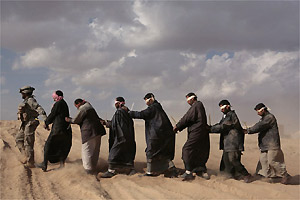
The ever excellent Juan Cole has written an superb expose on the top ten myths about Iraq in 2005. Click above for the full article, while the ten are summarised below:
1. The guerrilla war is being waged only in four provinces.
2. Iraqi Sunnis voting in the December 15 election is a sign that they are being drawn into the political process and might give up the armed insurgency
3. The guerrillas are winning the war against US forces.
4. Iraqis are grateful for the US presence and want US forces there to help them build their country.
5. Grand Ayatollah Ali Sistani, born in Iran in 1930, is close to the Iranian regime in Tehran
6. There is a silent majority of middle class, secular-minded Iraqis who reject religious fundamentalism.
7. The new Iraqi constitution is a victory for Western, liberal values in the Middle East.
8. Iraq is already in a civil war, so it does not matter if the US simply withdraws precipitately, since the situation is as bad as it can get.
9. The US can buy off the Iraqis now supporting guerrilla action against US troops.
10. The Bush administration wanted free elections in Iraq.
Tuesday, December 27, 2005
Scaremongering doesn't stop for Christmas.
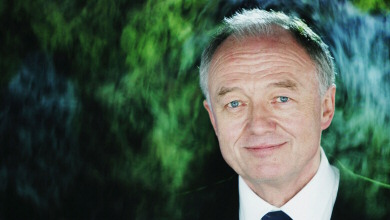
I didn't think that Ken would be so willing to pursue the agenda of those above him. The only explanation must be that he is being fed misinformation by an increasingly politically controlled and motivated police force:
Terrorists have tried to attack London 10 times in the four years since September 11, the mayor of London, Ken Livingstone, claimed yesterday, but he insisted the threat to the capital was disorganised and not part of an international conspiracy.
Mr Livingstone said eight attacks had been foiled between the attacks on New York in 2001 and the tube and bus bombings in London in July this year. Two attacks had been attempted since the July 7 deaths, he said, including the failed attempt to detonate bombs on the transport network two weeks later.
Mr Livingstone, speaking on BBC Radio 4, did not provide any further details about the attempted attacks, and his office referred further inquiries to the Metropolitan police.
The Met have been reluctant to disclose numbers and dates of foiled attacks for security reasons. Sir Ian Blair, the Met commissioner, did, however, disclose earlier this month that the authorities had thwarted several attacks since July 7, resulting in charges and some deportations.
President George Bush said two months ago that 10 al-Qaida plots had been foiled in the past four years, including three involving UK targets.
It has to be remembered of course that London as the capital of Britain has always faced threats from disaffected people of all political persuasions and beliefs, as Red Ken makes clear. Some of these supposed attacks could be real, and nothing to do with al-Qaida or any groups with a similar ideology. However, many of these are undoubtedly likely to be either non-existent, or plots such as the "ricin" one, where there was never any ricin and even if there had been, Kamel Bourgass had no idea how to actually use it.
What is the point of this scaremongering? Could it be that as the IPCC continues with the de Menezes inquiry, that the Met and its political masters are becoming increasingly concerned with what its findings may be? The constant reminders that London is under threat and that the police are our line of defence are made to make us remember that the real enemy is those who "hate our freedom" and not the police and parliament which continue to demand ever more draconian powers and the abolition of yet more civil liberties.
Saturday, December 24, 2005
Three stories all interconnected.
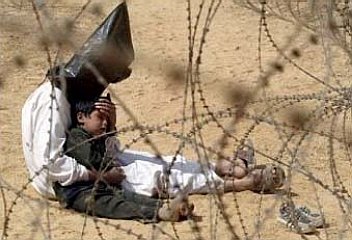
Lawyers acting for seven British residents detained in Guantánamo Bay have launched a court challenge to help secure their release.
They say Jack Straw, the foreign secretary, and Charles Clarke, the home secretary, are under a legal obligation to demand that the US frees the men. They should be treated in the same way as the nine British citizens who have already been released from the US detention camp in Cuba, their lawyers argue.
The seven concerned are Bisher al Rawi, Jamil el Banna, Omar Deghayes, Wahab al Rawi, Jahida Sayyadi, Sabah Sunnoqrot and Abubaker Deghayes. All were resident in Britain, some as refugees, before they were captured by the US.
Bisher al Rawi and Mr El Banna, two businessmen, were seized in Gambia in 2002 by CIA agents after being held by British intelligence officers in the UK before being released. Chris Mullin, a former Foreign Office minister for Africa, says they were seized by the Americans after a tip-off by the British authorities.
Bisher al Rawi and Mr Deghayes say British intelligence officers who questioned them in Guantánamo Bay said they would be released if they agreed to work for British intelligence.
Lawyers, led by Rabinder Singh QC, have drawn up an 82-page document asking for a judicial review of what they say is the failure by ministers to honour their legal obligations. They say ministers are wrong in claiming they have no legal right to intervene because the men are not British citizens.
Moreover, the fact that the US has shown no interest in trying them through military commissions shows Washington "has no interest in detaining them for the purpose of pursuing any criminal charges against them", their lawyers say.
The detainees were suffering serious violations of their human rights and there was serious risk they were also suffering abuse amounting to torture or inhuman and degrading treatment.
In a reference to Mr el Banna and Mr Deghayes, they say international law recognises refugees as particularly vulnerable, making their case even stronger.
The detainees' solicitor, Irene Nembhard of Birnberg Peirce, said yesterday: "The grounds of this claim point to British intelligence forces being complicit in both the seizure and interrogation of the detainees in Gambia and in Guantánamo Bay - what is now referred to as extraordinary rendition. Against this background, the subsequent refusal of the British government to seek the detainees' return and to deny any legal or moral responsibility to do so is reprehensible."
It was incomprehensible to the men's families that the foreign secretary refused to act in the light of the prime minister's comments in the Commons on November 22 2005 that the situation in Guantánamo Bay was an anomaly that ought to be brought to an end, she said.
Meanwhile, in the other prisons which the US and UK would rather you didn't know about in Iraq:
Detainees held by the British army in Iraq have been involved in disturbances this week in protest at being held without charge or trial, the Guardian has learned.
The governor of Basra has made representations to the British after complaints by family members who say that their relatives have gone on hunger strike in the Shaiba detention facility south of Basra.
Families of the men say that they were prevented from visiting their relatives on Thursday and blocked the road to the base in protest. They say that when a few did gain access they heard allegations of beatings and of men being attacked by dogs.
Yesterday a British military spokesman confirmed that some of the "internees" had been involved in disturbances and had been on hunger strike but were now "getting fed". The men are suspected of being involved in insurgency or terrorist activity in the British-controlled area.
Sadiq Mahmoud Karim, visiting Qasim Mahmoud Karim, who has been in detention for 18 months, said: "Some visitors decided to block the main road leading to the base and not move till they were allowed to visit their relatives."
And finally:
Lebanon yesterday became the third country to sign a deal with Britain that allows terrorism suspects to be deported back there. Under the deal, Lebanon, which has been accused of repeatedly breaching the human rights of its citizens, promises not to ill-treat anyone returned to it by Britain.
Amnesty International said Lebanon's human rights record continued to be of "serious concern". It said Islamist groups and opposition supporters had been detained without charge for political reasons and that there had been attacks on basic liberties such as freedom of expression and association.
The Foreign Office said a monitoring body would keep track of a suspect after deportation, but it is not clear which organisation would carry out this role. "We are in the process of identifying a suitable body, and discussions with the Lebanese authorities are ongoing," the Foreign Office said. It is also unclear whether any of the alleged terror suspects held pending deportation or subject to control orders are from Lebanon.
Mike Blakemore of Amnesty International said: "Torture, suspicious deaths in custody and the use of the death penalty are all matters of serious concern in Lebanon and it's dangerously misguided to expect countries with a known record of torturing people to respect bits of paper promising not to torture. So-called 'diplomatic assurances' of good treatment are frankly not worth the paper they're written on. The government should abandon this policy of trying to find a way around the international ban on torture and instead concentrate on condemning the torture of prisoners in places like Lebanon."
Mike Blakemore should also have added that the government has repeatedly failed to explain why these men cannot be tried in Britain. Is it because they have no case to answer, or because it would involve revealing British intelligence sources? The Independent reported earlier this month that some of those currently awaiting deportation or under control orders have not been interrogated or interviewed by either the police or MI5 the whole time they have been in custody. Why are these men apparently so dangerous that they cannot be allowed to go around in public, but who have also not seemingly committed any crime that the police or the security services wish to investigate further by interviewing the accused?
Those held in the Iraq camps are in a similar position of being held without charge. Those held at Guantanamo are apparently still being force-fed, as their hunger strike against the conditions there continues. It now seems that when our gentle hearts-and-minds winning British army stopped their prisoners from having visitors that they also rebelled. As to whether they have been ill-treated, who knows? Anything now seems to be possible or permissible. Merry fucking Christmas.
Thursday, December 22, 2005
Surveillance all the time, all of the time.
What a cheerful little story for the holiday season:
It would be cliche to make any references to 1984, but I'm going to anyway. Just remember, if you have nothing to hide, you have nothing to fear. Airstrip one, here we come.
Britain is to become the first country in the world where the movements of all vehicles on the roads are recorded. A new national surveillance system will hold the records for at least two years.
Using a network of cameras that can automatically read every passing number plate, the plan is to build a huge database of vehicle movements so that the police and security services can analyse any journey a driver has made over several years.
The network will incorporate thousands of existing CCTV cameras which are being converted to read number plates automatically night and day to provide 24/7 coverage of all motorways and main roads, as well as towns, cities, ports and petrol-station forecourts.
By next March a central database installed alongside the Police National Computer in Hendon, north London, will store the details of 35 million number-plate "reads" per day. These will include time, date and precise location, with camera sites monitored by global positioning satellites.
Already there are plans to extend the database by increasing the storage period to five years and by linking thousands of additional cameras so that details of up to 100 million number plates can be fed each day into the central databank.
Senior police officers have described the surveillance network as possibly the biggest advance in the technology of crime detection and prevention since the introduction of DNA fingerprinting.
But others concerned about civil liberties will be worried that the movements of millions of law-abiding people will soon be routinely recorded and kept on a central computer database for years.
The new national data centre of vehicle movements will form the basis of a sophisticated surveillance tool that lies at the heart of an operation designed to drive criminals off the road.
In the process, the data centre will provide unrivalled opportunities to gather intelligence data on the movements and associations of organised gangs and terrorist suspects whenever they use cars, vans or motorcycles.
The scheme is being orchestrated by the Association of Chief Police Officers (Acpo) and has the full backing of ministers who have sanctioned the spending of £24m this year on equipment.
More than 50 local authorities have signed agreements to allow the police to convert thousands of existing traffic cameras so they can read number plates automatically. The data will then be transmitted to Hendon via a secure police communications network.
Chief constables are also on the verge of brokering agreements with the Highways Agency, supermarkets and petrol station owners to incorporate their own CCTV cameras into the network. In addition to cross-checking each number plate against stolen and suspect vehicles held on the Police National Computer, the national data centre will also check whether each vehicle is lawfully licensed, insured and has a valid MoT test certificate.
It would be cliche to make any references to 1984, but I'm going to anyway. Just remember, if you have nothing to hide, you have nothing to fear. Airstrip one, here we come.
Wednesday, December 21, 2005
Whoops!
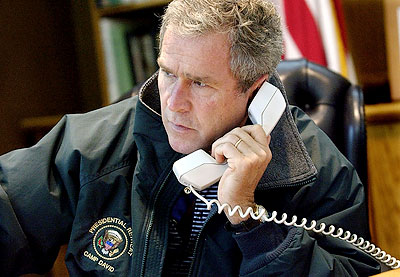
Any time you hear the United States government talking about wiretap, it requires -- a wiretap requires a court order. Nothing has changed, by the way. When we're talking about chasing down terrorists, we're talking about getting a court order before we do so. It's important for our fellow citizens to understand, when you think Patriot Act, constitutional guarantees are in place when it comes to doing what is necessary to protect our homeland, because we value the Constitution.
-- President George W. Bush, April 20, 2004
Laugh of the year.
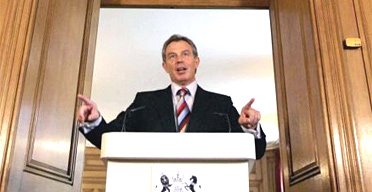
Tony Blair today shrugged off the revitalised challenge from the Conservative party, telling reporters their "big idea" seemed to be to "try and become more like New Labour", as he set out a new year reform programme for his government.
"If you look at it for a minute, what is the dominant agenda at the moment in British politics? What's the big idea coming from the Conservative party? To try and become more like New Labour.
Blair must be pissed off, because after all, isn't becoming like the Tories New Labour's job? It must hurt to have all your ideas stolen when you stole them in the first place.
Israel denies Palestinians from excerising their democratic right.
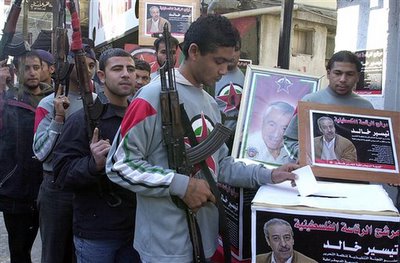
Everyone wants the Middle East to become more democratic, but Israel and the United States are only interested if the people support the 'right' parties:
January's Palestinian parliamentary elections have been plunged into crisis after Israel decided to prevent Palestinians in Jerusalem from voting.
Israeli prime minister's spokesman Raanan Gissin told the BBC it was concerned that the Palestinian militant group Hamas might gain power.
The Palestinian Authority condemned the decision and said it would cancel the poll if voting in Jerusalem is barred.
This election will be only the second since the PA was established in 1995.
Press reports also suggest that head of Egyptian intelligence, General Omar Suleiman, who met Palestinian President Mahmoud Abbas on Wednesday, is attempting to persuade Mr Abbas to postpone the vote.
Gen Suleiman has reportedly passed on a warning from the US and the EU that aid to the Palestinian Authority would be suspended if Hamas were to make big gains and become part of the future Palestinian government.
Palestinian Information Minister Nabil Shaath said that if there was no voting in Jerusalem, "there will be no elections at all".
"For us, Jerusalem is more important than any other thing," he added.
Chief Palestinian negotiator Saeb Erekat said the 25 January election would be sabotaged if Palestinians resident in East Jerusalem were prevented from voting.
"If these elections don't take place, it will be a catastrophe for the Palestinians," he said.
"I know what the Israelis have on their minds. They don't want a partner. They want unilateralism."
Hamas spokesman Sami Abu-Zuhri has told reporters that his group wants the election held as scheduled.
Mr Gissin told the BBC that the Israeli government had changed its stance since last January's presidential election, when voting had been permitted.
Under special voting arrangements for East Jerusalem - which Israel has annexed and sees as its exclusive domain, while international law decrees it to be occupied territory - Palestinians have previously been allowed to vote in Israeli post offices.
Mr Gissin said these had been exceptions, and stressed the government would not help what he called a terrorist organisation, Hamas, come to power.
In October, Israel pulled back from a policy of opposing the participation of Hamas in January's elections.
Israeli Justice Minister Tzipi Livni said it was not in Israel's interest to oppose Hamas' participation.
Israeli Prime Minister Ariel Sharon had said earlier that his government would hinder voting in the West Bank if Hamas candidates stood in the election.
This is all very ironic. Like America supported the mujahadein in Afghanistan during the 80s in their war against the Soviets, Israel supported and helped Hamas during the 70s and 80s as a bulwark against the PLO. Hamas has since grown hugely in popularity, especially since the death of Yasser Arafat. Hamas more or less runs the Gaza Strip, where Fatah has become marginalised due to corruption, both real and imagined. Hamas now threatens to make the same in-roads into the West Bank and East Jerusalem.
The Israelis are if anything just using delaying tactics. As it continues to build its so-called security wall, which cuts deep into Palestinian land and as the settlements continue to grow, Israel knows that it can get away with calling Hamas terrorists and therefore blocking them from gaining any sort of power. This is despite Hamas's repeated statements that if a viable two-state solution was available, with the right of return and East Jerusalem as the capital of Palestine, that they would lay down their arms and let the next generation decide whether to accept that. In other words, they would disband and live side by side with the Israelis in peace. This though is not compatible with Israel's simplistic message that Hamas is a extremist Islamic organisation that will accept nothing less than Israel's destruction. In constantly letting the world know what it thinks, Israel manages to continue to break both international law and the conditions of the road map to peace. It sets the unreasonable demand that the armed groups have to disarm and renounce terrorism before any negotiations begin, the exact opposite to what has led to relative peace in Northern Ireland.
It now seems that Israel is so afraid of Hamas becoming the main Palestinian political organisation that it will stop elections from taking place, making a mockery of George Bush's stated aims of being democracy to the Middle East. Whether Sharon is willing to give up more settlements if his new Kadima party wins power in Israel in the likely upcoming election, there is no chance of the 1967 borders being recognised in any subsequent deal for peace. Unless Sharon realises that only by not humiliating the Palestinians can be peace be broked, there will never be a deal. If he wants to be remembered as the man who brought peace and an end to the biggest source of discontent in the Middle East, then he will have to accept that bullets will never win over ballots.
In the meantine, Israel continues to make everyday life for Palestinians a complete misery:
"The entire West Bank is now becoming covered with phosphorescent yellow vests. A new ruling that will come into effect in Israel shortly will require every driver to wear this glowing garment when he leaves his car at night on the road. West Bank drivers, whose safety is especially important to Israel, have rushed to buy vests from the many peddlers on the sides of the roads: They know that they will be the first ones to get ticketed for violations. At the Qalandiyah checkpoint they cost NIS 15 each."Does that remind you of anything at all?
Tuesday, December 20, 2005
Boobwatch: Tits on the front page.
Ah yes, we're getting close to Christmas, everyone's getting ready for a holiday and of course Fleet Street is no exception. So cue some pathetic stories to fill space, or in this case, fill breasts:


Both the Daily Mail and Mirror have a superb story in that Sharon Osbourne is going to get her breast augmentation downsized. Of course, you can't illustrate such a story without showing a picture of them more or less hanging out, so the tabloid editors have found a convenient way of getting some tits on the front page.
Away from the main eye drawer, the Mail has some wonderful health tips. Think you're fat? Eat a balloon! Depressed? Get a skin patch! Daily Mail reader? Kill yourself!

Both the Daily Mail and Mirror have a superb story in that Sharon Osbourne is going to get her breast augmentation downsized. Of course, you can't illustrate such a story without showing a picture of them more or less hanging out, so the tabloid editors have found a convenient way of getting some tits on the front page.
Away from the main eye drawer, the Mail has some wonderful health tips. Think you're fat? Eat a balloon! Depressed? Get a skin patch! Daily Mail reader? Kill yourself!
Monday, December 19, 2005
Same old nasty Conservatives attack John Prescott.

Well, the new nice and cuddly Conservative party lasted for just over a week. When John Prescott yesterday made a principled and commendable stand over Blair 'n' Adonis's disastrous education white paper, both William Hague and David "No Brains" Willetts jumped all over him:
Speaking on BBC1's Sunday AM programme, shadow foreign secretary William Hague said the prime minister should take up Mr Cameron's offer.
"He (Tony Blair) knows that the only way to get results in say education, is to give greater freedom to schools at the local level. He knows that is the right thing to do.
"The question is, is he going to carry on and do the right thing, even if it means relying on the support of the Conservative Party, or is he going to give in to these old prejudices of John Prescott and others?"Shadow education secretary David Willetts said Mr Prescott was fighting old "class war" battles and ignoring young people already denied a good education because of selection by house price.
He told BBC News 24: "The crucial question for Ruth Kelly will be 'is it full speed ahead with reforms as set out by the prime minister or is it lots of clever little manoeuvres to water down some proposals, and back-tracking?'"
He added: "We shall see whether she is serious about reform or engaging in a retreat under pressure from Labour's left wing."
"The question is, is he going to carry on and do the right thing, even if it means relying on the support of the Conservative Party, or is he going to give in to these old prejudices of John Prescott and others?"
What John Prescott has articulated and is right to fear is a return to selection. Prescott experienced the humiliation of failing the 11-plus - yet he later went on to go to Oxford, and then got a degree from the University of Hull. William Hague went to a comprehensive. I can't find any information on where David Willetts went to school, but he was born in 1956. The 11-plus was on its way to being abolished in most schools by 1968, so he may well have been one of the last to take it, or he could have of course have been privately educated. Either way, his comments are cowardly and ring hollow. Surprise surprise, both Hague and Willetts went to Oxford.
John Prescott was a working class boy. The 11-plus was notoriously biased and discriminatory, with the results that middle class children were overwhelming those who filled the grammar schools. Those who failed the 11-plus were sent to the secondary moderns, where many experienced a self-fulfilling prophecy. They were made to feel as if they were failures, and many settled into that role, especially at a time when parents were less encouraging of their children and when aspiration was not as high as it is today.
Both Hague and Willetts accuse Prescott of being essentially prejudiced and fighting "old class war battles". The reality is that it is the Tories who are fighting the class war. They wish to reintroduce selection, as David Cameron has been exposed as supporting. John Prescott is defending the right of children not to be judged at such a tender age, for them not to be deemed failures, and for them not to give up on themselves. No one is suggesting that Prescott is condoning the middle class practice of moving into areas close to sought after schools. He obviously does not, and the alternative white paper from Labour backbenchers last week has measures to tackle this. The Tories real plan is to make Tony Blair depend on them to get his downright wrong education plans through - then when they have done so, to win the next election and make the plans even worse, and properly reintroducing selection.
This is David Cameron's supposed new liberal policies laid bare. They wish to abolish comprehensives, just as Labour's education reforms are finally bearing fruit. They are still many improvements to be made, and the alternative white paper is just what is needed. Can Blair not see that and see that Cameron is pushing him into a corner? There is not a more despicable policy that one that will condemn children into a life they can avoid. There is a huge majority both in the Labour party and the public for keeping comprehensives, and they need to make their voices heard now before Blair with the connivance of the Tories reintroduces a failed policy.
The street of shame.
Even by Fleet Street's usual standards, today's front pages are incredibly bad.

The Sun leads on the incredible story that Britain's second most worthless cuntbag had an argument at an airport. You can also read the Sun's XCLUSIVE (sic) interview with Shayne, who won the X (sic) Factor on Saturday. A no doubt fascinating tale. Away from those two sensational stories, we have the Sun supposedly talking to Saddam. I'm sure that they have a completely impartial story about it, if you want to find it. And last but not least, you can get a free page 3 picture on your mobile! I'm frantically dialling as we speak.

The Mirror splashes on the amazing fact that some inmates have threatened to kill the aforementioned Shayne's father, who apparently is in prison. A frightening prospect. The Mirror also claims to have Shayne's first interview, although they've probably just lifted the Sun's interview and reprinted the entire thing as their own. Their own EXCLUSIVE is a woman's love for mercy death father, which I assume is about last week's Wragg case. Whether anyone still cares or did care in the first place is debatable. And last but not least, the Mirror has a story on the winner of Strictly Come Dancing, Darren Gough. I can't remember (and I don't care) how many contestants there were to begin with, but at the most the odds at the start were 12-1. Congratulations on beating those odds, Darren!

The Star has yet another fucking feature on Shayne who claims to be the new Robbie Williams. He must be an incredibly arrogant moron with stupid tattoos, then. The Star also promises a poster of "Lucy", whoever she may be, topless. Journalism at its finest.

Last and certainly least, we have the Diana Express, sorry, Daily Express with another amazing exclusive on everyone's favourite dead princess. Whether she was knocked up in the motorhome is not disclosed, sadly.
It's enough to make you want to castrate yourself with a rusty switchblade.

The Sun leads on the incredible story that Britain's second most worthless cuntbag had an argument at an airport. You can also read the Sun's XCLUSIVE (sic) interview with Shayne, who won the X (sic) Factor on Saturday. A no doubt fascinating tale. Away from those two sensational stories, we have the Sun supposedly talking to Saddam. I'm sure that they have a completely impartial story about it, if you want to find it. And last but not least, you can get a free page 3 picture on your mobile! I'm frantically dialling as we speak.

The Mirror splashes on the amazing fact that some inmates have threatened to kill the aforementioned Shayne's father, who apparently is in prison. A frightening prospect. The Mirror also claims to have Shayne's first interview, although they've probably just lifted the Sun's interview and reprinted the entire thing as their own. Their own EXCLUSIVE is a woman's love for mercy death father, which I assume is about last week's Wragg case. Whether anyone still cares or did care in the first place is debatable. And last but not least, the Mirror has a story on the winner of Strictly Come Dancing, Darren Gough. I can't remember (and I don't care) how many contestants there were to begin with, but at the most the odds at the start were 12-1. Congratulations on beating those odds, Darren!

The Star has yet another fucking feature on Shayne who claims to be the new Robbie Williams. He must be an incredibly arrogant moron with stupid tattoos, then. The Star also promises a poster of "Lucy", whoever she may be, topless. Journalism at its finest.

Last and certainly least, we have the Diana Express, sorry, Daily Express with another amazing exclusive on everyone's favourite dead princess. Whether she was knocked up in the motorhome is not disclosed, sadly.
It's enough to make you want to castrate yourself with a rusty switchblade.
Saturday, December 17, 2005
Cameron: "I'm a liberal Conservative."
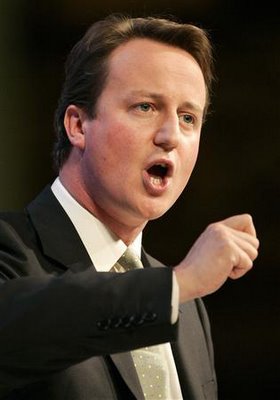
David Cameron yesterday moved to exploit the leadership crisis that has engulfed the Liberal Democrats by appealing to the party's supporters and MPs to "come and join the new Conservative party" if they want to see Labour defeated. Speaking in Hereford yesterday, the Conservative leader said that the two parties shared many values and that he was now the natural leader of a "modern, progressive, liberal, mainstream opposition to Labour".
"Let me make one thing clear. I'm a liberal Conservative. So I believe it's time for Liberal Democrat voters, councillors and MPs that share these values and this agenda to come and join the new Conservative party," he said.
Mr Cameron's allies have been attempting to build links with Lib Dem MPs in the hope of persuading some to defect before the next election. In his speech Mr Cameron set out the importance of cutting into Liberal Democrat support to gain the 126 seats he needs to form a majority government.
So what exactly has Mr Cameron done so far to show that he is a "liberal Conservative?" Despite that almost being an oxymoron, we can have a quick look back at his record. So far his only main policy announcements have been to have a list of candidates for seats that would be widely inclusive, and that he will support the government on their education white-paper. In actual fact it's obvious that Cameron and his new conservative cronies actually wish to go much further than the already dangerous education white paper, and if they could, re-introduce selection for secondary education. So, he's for making sure that the working classes are kept down. That isn't very meritocratic, one of Tony Blair's favourite words, and Cameron's obvious hero.
The other piece of evidence we have of Cameron being a liberal conservative is that he wrote this year's Conservative party manifesto. Let's take a brief look at some of its main points:
The Conservatives are promising to create more good local schools. Parents will have the right to choose the best schools for their children, which means they will be able to send their child to an independent school for the cost of a state-funded education.
In other words, giving money to the rich who would send their kids to "independent" i.e. private and exclusive schools anyway.
Headteachers and governors will have complete control over discipline in school, including control over admissions and exclusions. Heads will set minimum standards of behaviour and will no longer be forced to admit children excluded from other schools. The party will establish Turnaround schools for disruptive pupils - at a cost of £200m a year. Pupils will attend full-time and will only be readmitted to mainstream schools if their behaviour significantly improves.
In other words, we'll throw all the little bastards out of sight of everyone and let them all kill each other out of harm's way, away from our own little darlings. Headteachers will also have complete control over admissions - why, that sounds remarkably similar to selection, doesn't it?
The Connexions careers service will be scrapped and a new service created with strong business involvement.
Ah yes, get them stacking the shelves and make the promise that they might just one day be able to become a manager.
Let's move on asylum and immigration:
Michael Howard has said that an incoming Conservative government would ask parliament to approve a limit on the maximum number of refugees allowed into the United Kingdom. A quota of around 20,000 a year would be set - even though it could mean genuine refugees are refused the right to refuge and asylum in Britain. Applicants for entry to the UK would be processed at offshore asylum centres.
So if there was a catastrophe in say, Zimbabwe or another country which forced huge numbers to leave, they wouldn't be able to come to our little island if the nice round figure of 20,000 had already been reached. The "offshore asylum centres" is a euphemism for the Tories' infamous fantasy islands' - places they hadn't found where they would keep all the darkies to make sure they couldn't rob the decent taxpayers of their money.
How about crime and law and order?
The party intends to return cannabis to a class B classification to resolve current confusion.
This conflicts with Cameron's personal statements that he would keep cannabis as Class C and would also consider downgrading Ecstasy - about the only other truly liberal policy he would like to implement. Too bad his party wouldn't let him.
Pledges to create 20,000 extra prison places to guarantee that sentencing will not be driven by capacity. Plans an end to the early release scheme that sees prisoners monitored by electronic tagging and believes community sentences should only compliment not substitute prison.
In other words, prison works! Even though we've got over 80,000 already serving time and that crime has been falling for 10 years, we need to clamp back down on the yobs and scroungers who blight our streets. Never mind that it would take years to build new prisons and that the early release schemes are broadly successful. Community sentences shouldn't substitute prison - in English that means throw everyone away, and we'll think about the consequences when they come out much the worse for their experience later.
Wants to see the civil law provision that a householder will be only be prosecuted for "grossly disproportionate" action against a burglar extended into criminal law through a householder protection bill.
In other words, the Tories want you to have the right to murder anyone who sets foot on your property. This despite that the law already covers 'reasonable force' being used against intruders. The most infamous case of this kind, the Tony Martin debacle, was only taken to court because he had purposefully lay in wait for the two men who broke in and then shot them when they were in fact running away. Still, it's a good soundbite and it makes all of us who consider our home our castle feel more secure.
How about 'tax and spend'?
The Conservatives promise to spend £4bn of their £12bn worth of efficiency savings on tax cuts. They plan to spend £1.3bn of that on halving council tax for the over-65s and are believed to be considering raising the threshold at which low earners start to pay income tax and cutting inheritance tax and stamp duty further. Ten million workers would get tax relief on their pension contributions, using £1.7bn of the Tories' efficiency savings. The Tories have promised to abolish the 1% stamp duty on house purchases below £250,000. At the last Budget, the threshold was raised from £60,000 to £120,000. The Tories claim that lifting it to £250,000 will free more than 500,000 homebuyers a year from stamp duty, and leave 80% of house purchases unaffected by the tax.
The Tories never managed to explain how they were going to cut taxes and still keep up Labour's spending on the public services. They also promise to go the way of the Republicans in America in trying to abolish inheritance tax, which they misrepresent as a death tax, which helps the Treasury immensely and makes sure that money which is left behind for no one does not just lay dormant.
And finally, let's look at Health:
The party supports free choice for NHS patients in terms of care delivery. Patients will have the option of going private, with 50% of their costs underwritten by the state. GPs will advise patients on the best hospital for their needs.
Similar to their schools policy, they'll pay half the cost to those already wealthy enough to go private out of the pockets of those who rely on the NHS. Their choice policy is similar to Labour's, which is still not supported the public, as opinion polls consistently show a majority in favour of just one good high quality local hospital, not the choice of five in the region.
Is a man who wrote the above really a "liberal Conservative"? Or is he just another nasty man disguised by charisma and good looks? Until Cameron proves that not just he but his party has managed to move on from the above failed policies, no self respecting Lib Dem, let alone anyone else, should touch the Conservatives with a 10-foot pole.
Friday, December 16, 2005
Blair considers lifting ban on tapping MPs' phones.
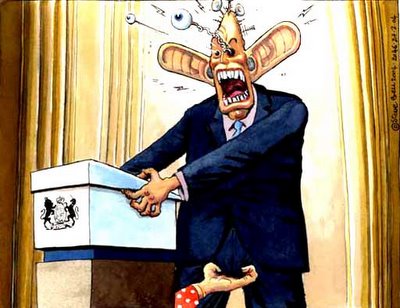 Is there really no depth to which this government will not sink?
Is there really no depth to which this government will not sink?Tony Blair yesterday indicated that he may scrap or change a longstanding ban on tapping of MPs' phones brought in by his Labour predecessor at No 10 Harold Wilson.Is this really about the Regulation of Investigatory Powers Act or is it about Blair's continued seeming loss of reality? Who is to say that Blair wouldn't like to have his opponents in parliament bugged? With the Campaign group of MPs' raising hell, and even former loyal ministers supporting the alternative education paper published this week which Blair arrogantly dismissed out of hand, he may well be feeling hemmed in from all sides, with a seemingly resurgent Tory party led by Cameron. Maybe I'm just clutching at straws and that such a ban would only be used against the Sinn Fein MPs who don't even sit in the house.
MPs were given a government guarantee that their phones would not be tapped by police or the security services, "whatsoever the circumstances", by Wilson in the late 1960s.
Prime ministers including Mr Blair have regularly confirmed to parliament that the rule remains in place. Although the ban, known as the Wilson doctrine, does not carry statutory backing, MPs must be told by the prime minister if it is to be changed.
Yesterday Downing Street appeared to take steps towards that in a written statement to MPs. In it, the prime minister said he had received advice about the implications for the ban of the Regulation of Investigatory Powers Act, passed by parliament amid much controversy in 2000.
The statement said the new advice had come from Sir Swinton Thomas, the interception of communications commissioner, and that Mr Blair was considering "possible implications".
Last night a Downing Street official confirmed a decision on whether the Wilson doctrine would be changed was expected in the new year but refused to reveal details of Sir Swinton's advice.
Norman Baker, Liberal Democrat MP for Lewes, yesterday called for the protection that MPs currently enjoy to remain in place. He has repeatedly called on the government to reveal whether any MPs have had their phones tapped.
In 2003 it was suggested in parliament that the phones of at least one Sinn Féin MP had been bugged.
After making the guarantee, Wilson became convinced in his second spell as prime minister that he was himself being monitored by the security services.
One thing though is certain. Blair is striving for a legacy, and the only thing that the public at the moment will remember him for is Iraq. That is why he seems so determined to push ahead with the education reforms that he and Lord Adonis had as much a hand in as Ruth Kelly. He doesn't realise that if he tries to push through the white paper, not only will Labour desert him, but he will be sealing his own fate.
Thursday, December 15, 2005
No Trousers Charlie wins EU pact for new snoopers charter.
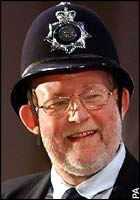
Remember the snoopers charter? Back in the halcyon days of 2002, the then home secretary David Blunkett intended to let hundreds of different government officials and companies have access to the records of internet and mobile phone usage. He backed down after the plans were leaked to the Grauniad, sparking outrage. Now 3 years later Charles Clarke has managed to get a very similar piece of legislation through the European parliament, and hardly anyone has batted an eyelid.
The home secretary, Charles Clarke, yesterday won an agreement across Europe to ensure that telephone and internet records are stored by telecoms companies for up to two years.
The deal, which won the backing of the European parliament yesterday, will mean that police investigating terrorism and serious crime will have access to the commercial traffic logs of all phone calls, text messages, emails and instances of internet use by suspects.
Mr Clarke said: "This agreement on retaining communications places a vital tool against terrorism and serious crime in the hands of law enforcement agencies across Europe."
The new EU directive will make it mandatory for telecoms firms to keep phone and internet data for a minimum of six months but will not cover police access to the content of calls or emails, and will be subject to strict data protection. Mr Clarke said yesterday he would however urge EU governments to make it mandatory to store data for up to two years. He had made the issue a key element of the British presidency of the EU; it proved highly controversial, with Germany, Ireland and other countries raising concerns about privacy and cost.
The deal will mean that the voluntary agreement with the telecoms industry in Britain will now become mandatory across the EU. At present in Britain, emails, text messages and internet data are kept for six months. Telephone details, including numbers dialled, the time and duration of calls, and location of the mobile, are kept for 12 months.
Even details of calls that are connected but go unanswered will be archived on the grounds that they could be signals to accomplices or used to detonate a bomb.
Mr Clarke said yesterday the EU member states would each decide on how long the data should be kept, and whether they would reimburse telecoms firms. The UK contributes £6m a year to national costs.
There was also flexibility in the ruling to ensure new forms of data are covered.
Yesterday, the Liberal Democrat MEP Sarah Ludford said it amounted to a green light for mass surveillance: "Ordinary citizens could find details of their movements, acquaintances and favourite websites circulating in Whitehall."
On the surface the deal sounds fairly reasonable. Only police investigating terrorism and serious crime are likely to have access to the records, and then they will only be able to see the time messages and calls were made, not the content of them. Then you realise that "serious crime" can be very broadly interpreted. MI5 during the 80s kept huge databases on "subversives", many containing information on people who only had a casual interest in left wing politics or might have happened to attended a protest on nuclear disarmament. Now we are also told that embassies are drawing up lists of people who should be banned from entering the UK. Babar Ahmed is being extradited to the US on the pretext that he supported Islamists in Chechnya and Afghanistan through a website that was based in the United States, despite him living here.
None of the above inspires confidence that these powers will not be abused. Of nearly every new power the police are given, they use it to their advantage in ways which it was not meant for, i.e. the section of the Terrorism Act that led to the heckler at the Labour party conference being stopped from entering the hall. Then we remember that there are many companies dying to get their hands on our personal information, such as the major supermarkets and advertising firms, let alone those who use such information to set up bank accounts in the names of those who become victims to identity fraud. Finally, we have the entertainment industry, which would dearly love to have to avoid the hassle of getting court orders against ISPs to reveal what their customers are doing on the web, intent on cracking down against the teenagers who dare to sample music or films before they buy.
Just try and imagine all the phone calls, messages and web sites you would make, send and visit in two years. Through this the authorities can build up a whole picture of the life that you lead. We trust the companies that we use to keep this information private, and the majority have done. Can we trust that the government will be so careful? Many will say that if you've nothing to hide, then you've nothing to fear from such legislation. The simple answer to that is that everyone has something to hide, some thing however small or big that they would never tell either their partners, their friends or their parents. With this legislation, the government and the police will know your every movement, if they are so inclined to inquire about it. Faced with the threat of suicidal terrorism, it seems that the public and the majority of the politicians have given up their privacy to stop a small minority of threatening people. Once again, those who wish us harm seem to have won.
Wednesday, December 14, 2005
Most wanted: Corporate human rights violators of 2005.

The full account with what they have done and continue to do is available here, but here's a quick roll-call of shame:
CATERPILLAR
CHEVRON
COCA-COLA
DOW CHEMICAL
DYNCORP/CSC
FORD MOTOR COMPANY
KBR (KELLOGG, BROWN, AND ROOT): A SUBSIDIARY OF HALLIBURTON CORPORATION
LOCKHEED MARTIN
MONSANTO
NESTLÉ USA
PHILIP MORRIS USA and PHILIP MORRIS INTERNATIONAL (a.k.a. the Altria Group Inc.)
PFIZER
SUEZ-LYONNAISE DES EAUX (SLDE)
WAL-MART
I'm guessing the only reason that BP, Exxon, Shell and Tesco aren't on there is because everyone is only too well aware of the enormous damage they are causing.
The death of free speech.
By now you've probably heard of the case of Maya Evans, who was arrested and convicted under the "Serious Organised Crime and Police Act 2005" for committing the heinous crime of daring to read out the names of dead Iraqis outside Downing Street. She was caught under a piece of reprehensible legislation that was mainly meant to remove Brian Haw from Parliament Square (He remains, as a judge found that the law had been poorly drafted and as Mr Haw's protest began before the act was passed, it did not apply to him.). The legislation requires planned protests to be cleared by the police before they go ahead, a piece of nonsense purely concocted by MPs who were annoyed by the protests by schoolchildren before the Iraq war began, and also the protests by the Countryside Alliance, when they clashed with police.
You know that the threat to freedom of expression in this country is serious when you get Tony Blair's best mate and chief apologist in parliament, Charlie Falconer coming on to Radio 4 to say the following:
I like how he seems to refer to legitimate protest as "disorder". Obviously reading out the names of Iraqis who have died as a result of our actions slows down the traffic and might aggravate the tourists that come to our glorious capital city. Even Tony's chief unelected crony didn't go so far though as Maya Evans own MP, who wrote to the Independent:
So though the prosecution was unfortunate, an overreaction and zealous, nowhere does he mention that it was wrong. It also isn't an attack on free speech, because if you wish to express your right to protest you have to inform the local plod first. But wait, what's this? Oh yes, the dear Michael Foster of course has to bring in a reference to terrorism. Apparently a terrorist atrocity could be masked beneath the veneer of a peaceful protest, although he doesn't quite explain how. Perhaps the protestors could deliver a biological attack by coughing on MPs as they try to enter the House.
I'll leave the best to last though. Guess who said this in 2002:
Yes, it was the Dear Leader himself. We have now lost that freedom. If you don't want to be arrested, tried and convicted, you'd better make sure that you don't do something that could be considered a protest within a mile of Parliament. Thanks Tony, thanks Charlie and thanks Michael. You guys sure are saving this country from the mongrel hoards who wish to impose totalitarianism.
You know that the threat to freedom of expression in this country is serious when you get Tony Blair's best mate and chief apologist in parliament, Charlie Falconer coming on to Radio 4 to say the following:
The lord chancellor branded as "ridiculous" yesterday claims that the prosecution of a peace campaigner for reading out the names of British soldiers who have died in Iraq showed that free speech was threatened.
Maya Evans was last week given a conditional discharge and ordered to pay ��100 costs after being prosecuted under the Serious Organised Crime and Police Act, which limits protest around Westminster, for reading the names by the Cenotaph in Whitehall.
Speaking on BBC Radio 4's Today programme, he said the law "was a simple measure to avoid disorder around parliament".
I like how he seems to refer to legitimate protest as "disorder". Obviously reading out the names of Iraqis who have died as a result of our actions slows down the traffic and might aggravate the tourists that come to our glorious capital city. Even Tony's chief unelected crony didn't go so far though as Maya Evans own MP, who wrote to the Independent:
Sir: I am really sorry that my constituent Maya Evans was convicted under Section 122 of the new Serious Organised Crime and Police Act 2005 (report, 8 December).
On the face of it, it looked to be an overreaction on the part of the prosecutors but be that as it may, it would be wrong to say that the legislation is unnecessary. Its purpose is not to deny protest but to ensure that such protest is possible.
Historically all sorts of protests have taken place around Parliament, but with the current terrorist threat it would be easy to mask a terrorist atrocity under the guise of a legitimate demonstration. The easy solution would have been to simply ban such protest - as the media indeed claim is the purpose of the Act - but that was not the Government's intention.
Ms Evans's prosecution is unfortunate and appears to have been somewhat zealous, but to suggest it is an attack on free speech is bizarre. Such a right must be, and indeed is, protected by this legislation.
MICHAEL FOSTER MP
HASTINGS AND RYE
So though the prosecution was unfortunate, an overreaction and zealous, nowhere does he mention that it was wrong. It also isn't an attack on free speech, because if you wish to express your right to protest you have to inform the local plod first. But wait, what's this? Oh yes, the dear Michael Foster of course has to bring in a reference to terrorism. Apparently a terrorist atrocity could be masked beneath the veneer of a peaceful protest, although he doesn't quite explain how. Perhaps the protestors could deliver a biological attack by coughing on MPs as they try to enter the House.
I'll leave the best to last though. Guess who said this in 2002:
I may not like what they call me, but I thank God they can. That's called freedom."
Yes, it was the Dear Leader himself. We have now lost that freedom. If you don't want to be arrested, tried and convicted, you'd better make sure that you don't do something that could be considered a protest within a mile of Parliament. Thanks Tony, thanks Charlie and thanks Michael. You guys sure are saving this country from the mongrel hoards who wish to impose totalitarianism.
Tuesday, December 13, 2005
"Sir" Ian Blair continues to scaremonger.
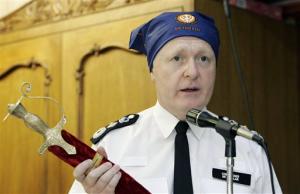
Does this man never know when to shut up?
The terrorist threat to the UK has intensified so much since July 7 that Scotland Yard gets high-grade intelligence on suspects almost every day, in contrast to the monthly reports it received before the London bombings, the UK's most senior police chief said yesterday.
Sir Ian Blair, the commissioner of the Metropolitan police, told a Metropolitan Police Authority conference on terrorism, where relatives of the July 7 victims were among hundreds of delegates, that cells were plotting further attacks.
"The level of threat has intensified and continues to intensify. The terrorists are here and they are going to go on attempting to kill people like you and people like me," he said. "The sky is dark. You may argue on the current legal position or British government's position, but we are in a different place than before the opening of this century.
"There are currently people in the UK as we speak who are planning mass atrocities and who will use suicide as a weapon. That's a different place to where we have been in my lifetime."
He said there had been a 75% increase in counter-terrorism operations by his officers since the July bombings. Three conspiracies had been thwarted since July 7, which had resulted in charges and deportations, he said, although he declined to comment further owing to ongoing court cases.
"Before July 7, my service and the security services believed themselves to be absolutely flat out against international terrorism," he said. "We are now further flat out than we could have ever imagined ourselves to be."
Referring to high-grade intelligence reports, Sir Ian said: "Andy Hayman [the Met's assistant commissioner in charge of anti-terrorism] would expect to get, before July, maybe one every month. Now, it's almost daily." The UK terrorist threat level has remained at "severe general" since late August and security chiefs believe that London is a prime target.
If Ian Blair is telling the truth, and judging by his inability not to and to misinform in the past, I wouldn't bet on it, then the reasons why the "threat" has increased are simple. The police are no longer taking any chances, and are pulling in anyone they even suspect of daring to search the internet for terrorist sympathisers websites, or even viewing beheading videos.
Other reasons include fighters either returning from Iraq or choosing to come here because of the UK's role in Iraq, trained and with further knowledge of how to plan jihadi attacks. As Tony Blair and many other government ministers do not dare to admit, the Iraq war has made us a huge target for all those who are violently opposed to the presence of the West in Iraq. Instead of countering this by withdrawing, or admitting to the mistakes made, they continue to make vacuous statements about not "cutting and running" while they are actually into the final stages of planning their escape, likely to begin next year. Instead of reacting to the July the 7th attacks proportionately, Blair ruined the consensus with the other parties with his "the rules of the game are changing" speech. With the tabloids baying for blood, he gave in and as a result was defeated by a parliament that finally found its dissenting voice. The result is that we are now back to the scaremongering of before the Iraq war, and "Sir" Ian Blair is more than happy to play the role of ramping up the fear factor. Like Bush, he gives details of attacks supposedly thwarted, then fails to give any evidence of these threats. The government then wonders why the public doesn't believe them when they call for more powers and awareness.
The sooner the government and the police realise that this cycle of idiocy is helping no one the better. Either keep us updated on what is happening, with some proper evidence or facts, or don't bother. The last thing we need is the constant scaremongering of a head of police who wasn't even informed that an innocent man was executed by his officers until the following day (if he was telling the truth, of course).
Steve Bell: Pants on fire.
Sun-watch: Beyond parody.
Here's today's superb Sun front-cover banner boost.

Three stories: one intruding in the private grief of a mother whose son was killed, another on footballers going to a casino, and last but certainly not least, one on the page 3 lesbians of last week.
The first exposes Mary Wragg as a "coke mom". Obviously revealing that she uses cocaine is in the public interest, as it really helps us understand why she gave evidence against her husband for ending the life of their severely disabled son. The Sun would never cause further distress to a person who has just been told that she was complicit, whether she was or not, oh no.
The second story is an amazing exclusive that the Chelsea footballers went to a casino for an Xmas party and John Terry allegedly won £200,000. I never would have believed that footballers gambled if the Sun hadn't told me about.
And finally we have the page 3 lesbians of last week with hints and tips for others. Their guide isn't meant to titillate men or lead them to retreating to the toilet at work with the paper, that would be tawdry and disgusting.
The reason for these typical tabloid stories is that the Sun and its red top stablemates are starting to get even more desperate. Last month's ABCs showed that all their sales continued to fall. It can't be too long before Murdoch comes up with another cut-price wheeze or makes some changes to the production team. And if the last few days are anything to go by, it'll be another race to the bottom of the barrel.

Three stories: one intruding in the private grief of a mother whose son was killed, another on footballers going to a casino, and last but certainly not least, one on the page 3 lesbians of last week.
The first exposes Mary Wragg as a "coke mom". Obviously revealing that she uses cocaine is in the public interest, as it really helps us understand why she gave evidence against her husband for ending the life of their severely disabled son. The Sun would never cause further distress to a person who has just been told that she was complicit, whether she was or not, oh no.
The second story is an amazing exclusive that the Chelsea footballers went to a casino for an Xmas party and John Terry allegedly won £200,000. I never would have believed that footballers gambled if the Sun hadn't told me about.
And finally we have the page 3 lesbians of last week with hints and tips for others. Their guide isn't meant to titillate men or lead them to retreating to the toilet at work with the paper, that would be tawdry and disgusting.
The reason for these typical tabloid stories is that the Sun and its red top stablemates are starting to get even more desperate. Last month's ABCs showed that all their sales continued to fall. It can't be too long before Murdoch comes up with another cut-price wheeze or makes some changes to the production team. And if the last few days are anything to go by, it'll be another race to the bottom of the barrel.
Monday, December 12, 2005
Lies and misinformation: just another interview with Jack Straw.
Jack Straw is a liar.
That's a pretty serious allegation to make, but I feel it is entirely justified. On today's Radio 4 Today programme,
Last Tuesday the Guardian published details of flights identified as being charted CIA planes and CIA-owned jets landing at numerous airports around Britain. You can see the tables below. A couple of them are believed to have definitely been involved in carry kidnapped prisoners. Whether they were carrying the prisoners at the time is unknown. Is Jack Straw denying that these flights landed in Britain? Is he saying that this is all the Guardian's imagination, and that the planespotters who saw these planes were seeing mirages?
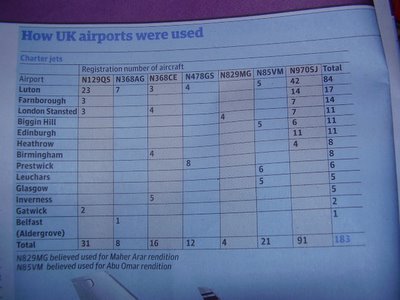
 The Lib Dems foreign spokesman, Sir Menzies Campbell said:
The Lib Dems foreign spokesman, Sir Menzies Campbell said:
That's a pretty serious allegation to make, but I feel it is entirely justified. On today's Radio 4 Today programme,
he said that there was no evidence that US "extraordinary rendition" flights had passed through the UK. "Careful research has been unable to identify any occasion ... when we have received a request for permission by the United States for a rendition through the United Kingdom territory or airspace."Perhaps so. But this entirely ignores a simple fact. The US hasn't asked anyone's permission. Both Poland and Romania, countries which supposedly housed secret CIA prisons, have said they had no knowledge of the US using their soil for such purposes. Are all the countries in Europe, all of which have said they have little or no knowledge of what America has been up to lying about what has gone on? Probably not. What some do know however is that they can get away with lying about what they do know. Jack Straw has managed to use this to his advantage.
Last Tuesday the Guardian published details of flights identified as being charted CIA planes and CIA-owned jets landing at numerous airports around Britain. You can see the tables below. A couple of them are believed to have definitely been involved in carry kidnapped prisoners. Whether they were carrying the prisoners at the time is unknown. Is Jack Straw denying that these flights landed in Britain? Is he saying that this is all the Guardian's imagination, and that the planespotters who saw these planes were seeing mirages?
"I have no doubt of the good faith of the foreign secretary in this matter, but the truth is that the British authorities simply don't know whether extraordinary rendition is taking place using British airfields," he said. "The sooner we have a system of inspection, the better."I am willing to bet that the British authorities know full well about these extraordinary rendition flights. If the government doesn't know, and the Department of Transport doesn't know, then I find it very difficult to believe that MI5/6 also do not. Whether they have been telling the government or not is a different matter. If they have, then Jack Straw needs to consider his position. If not, then MI5/6 needs to explain itself.
Karen Buck, the aviation minister, told Sir Menzies that this "indicates that if these aircraft landed in the UK they were either not involved in civil commercial transport or were stopping for technical purposes, for example to refuel".Karen Buck is being very careful, and for good reason. In another article in last week's Guardian, there was this:
The British government is guilty of breaking international law if it allowed secret CIA "rendition" flights of terror suspects to land at UK airports, according to a report by American legal scholars.So now Karen Buck is denying even that permission was given to the aircraft to refuel. Obviously they just landed, refueled and went on their way without anyone noticing, no contact with control towers, and without anyone asking who they were. Is this government now so arrogant that it thinks that we will believe this? This is a classic example of spinning, of distorting the original question and answering in such a way as to conceal the truth. I also find it outrageous that the Conservatives have not asked any questions or got involved in this at all. Instead it has been the Lib Dems and the media who have run with this and tried to get answers out of the government. The answers we have got are deeply unsatisfactory. They are, I believe, lies and carefully crafted misinformation. Jack Straw knows full well what has been going on, and if he didn't, he does now. He should drop the bullshit and apologise, instead of covering up for the Americans and their continued breachings of international law.
Merely giving permission for the flights to refuel while en route to the Middle East to collect a prisoner would constitute a breach of the law, according to the opinion commissioned by an all-party group of MPs, which meets in parliament for the first time today.
Saturday, December 10, 2005
Asda continues the inexorable rise of the multinationals.
Another step towards high streets which look exactly the same wherever you are:
Although it's tempting to feel that my enemies enemy is my friend, Asda is if possible even worse than Tesco. If Asda intends to fix prices so that they are lower than anywhere else, many of those in the supply chain are going to suffer. Also going to suffer are the local competitors, who don't have a chance to compete with such prices. The only "winner" is the consumer, who as always is the one who matters.
The corporate takeover of Britain is almost entirely complete. Unless something is done soon, the only "choice" we are going to have is between the likes of Tesco and Asda, both predatory firms with dubious human rights records, who keep huge amounts of information on the customer which they sell on for huge amounts of money. While you have big brother watching you on CCTV, you have big brother happily sitting in your wallet as your "Clubcard". Most of all, Tesco and Asda don't care about the implications on the towns which they move in on, as traditional jobs are lost as well as the character and individuality of the town. They claim that they are creating jobs, when they are simply just employing either feckless teenagers or re-employing those who have lost their jobs as a result of the superstore.
It's not too late. The best way to say no to such companies is to use the local shops which do remain; you might be surprised that they are actually cheaper and have better quality produce. Support local farmers markets or services such as organic box deliveries. Fair trade shops are also increasingly springing up. And if you must shop at Tesco or Asda or similar, don't use a "loyalty" card. The less information they have on you, the better.
Supermarket chain Asda is to challenge Tesco's mounting dominance with a new chain of discount food stores across the country. Britain's second biggest grocery chain, which is part of the US Wal-Mart empire, will announce plans for hundreds of the new-look stores next week.
The stores will be a direct challenge to Tesco's Express and Sainsbury's Local convenience stores which have been so successful in recent years.
This intensification of competition in the sector is also likely to reignite the debate over whether the big supermarket chains are changing the face of Britain's high streets - squeezing out small, local operators who are unable to match the buying power of the big chains.
They will be one of a series of initiatives designed to mount a more effective challenge to the dominance of Tesco, which now has a market share of more than 30%. In the past 12 months Asda's trade has stood still. Asda's new outlets have yet to be named, though the first will be opened in Northampton next month. The supermarket group has been developing the concept using the codename "Project Disco".
In size terms, the new stores are likely to average 7,000-10,000 sq ft - slightly larger than Express and Local outlets. Until now Asda has sold food and clothing only from superstores of 80,000 sq ft and larger. The new stores are understood to have been modelled on a successful French chain called Leaderprice.
The aim is to create the cheapest chain of food shops in town, undercutting even discounters such as Aldi and Netto. A source close to Asda said: "Store managers will be given the power to fix prices at a local level in order to ensure Asda is charging the lowest prices in the area."
Asda intends to find high street and retail park locations for the new chain and it is understood that the company is prepared to open some stores next to Tesco outlets in order to mount a direct challenge and lure away Tesco shoppers. The new stores are the first significant initiative from chief executive Andy Bond, who took over at Asda this year.
Asda's Mr Bond and Mr Fitzsimmons are likely to insist their new venture is not a move into convenience stores and will instead label them "community" discount stores.
Although it's tempting to feel that my enemies enemy is my friend, Asda is if possible even worse than Tesco. If Asda intends to fix prices so that they are lower than anywhere else, many of those in the supply chain are going to suffer. Also going to suffer are the local competitors, who don't have a chance to compete with such prices. The only "winner" is the consumer, who as always is the one who matters.
The corporate takeover of Britain is almost entirely complete. Unless something is done soon, the only "choice" we are going to have is between the likes of Tesco and Asda, both predatory firms with dubious human rights records, who keep huge amounts of information on the customer which they sell on for huge amounts of money. While you have big brother watching you on CCTV, you have big brother happily sitting in your wallet as your "Clubcard". Most of all, Tesco and Asda don't care about the implications on the towns which they move in on, as traditional jobs are lost as well as the character and individuality of the town. They claim that they are creating jobs, when they are simply just employing either feckless teenagers or re-employing those who have lost their jobs as a result of the superstore.
It's not too late. The best way to say no to such companies is to use the local shops which do remain; you might be surprised that they are actually cheaper and have better quality produce. Support local farmers markets or services such as organic box deliveries. Fair trade shops are also increasingly springing up. And if you must shop at Tesco or Asda or similar, don't use a "loyalty" card. The less information they have on you, the better.
Friday, December 09, 2005
Charges possible over De Menezes; Air Marshals knew man was mentally ill.
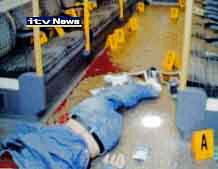
One day, two reports on men wrongfully shot:
The chair of the commission investigating the fatal shooting of Jean Charles de Menezes today said it was "likely" its findings would be passed to the Crown Prosecution Service.
Mr De Menezes, a Brazilian national, was shot seven times in the head by armed police officers at Stockwell underground station, in south London, who thought he was a suicide bomber.
The handing over of the report from the Independent Police Complaints Commission could lead to criminal charges being brought against the officers.
Asked whether the report would be handed over, Nick Hardwick, the IPCC chair, said: "I think that is likely."
Charges are brought against officers when the IPCC submits a report to the CPS and the prosecution service decides there is a case to pursue.
Mr Hardwick said the IPCC had to decide whether its findings indicated criminal offences might have taken place. The CPS would then have to decide whether to bring charges against any of the Scotland Yard officers involved.
Mr Hardwick quashed rumours that some of the CCTV tapes from the platform where the shooting happened were missing. However, he refused to say whether one or more of the cameras had not been working properly on the day of the shooting.
The senior investigator, John Cummins, admitted to "problems with the equipment" but did not elaborate.
It is not known which offences the IPCC would ask the CPS to consider if the report were handed over.
The IPCC chair also revealed that the investigators had not interviewed Sir Ian Blair, the Metropolitan police commissioner. He refused to confirm whether a statement had been taken from him.
David Davis, the shadow home secretary, said: "It is inexplicable that Sir Ian Blair has not been interviewed. The public expect a full and thorough investigation in a case like this, and it would be no reflection on Sir Ian to be interviewed.
"There is a fine balance to be struck between protecting the safety of the public, operational priorities of the police and natural justice. The public expect no stone to be left unturned in this inquiry.
"The last thing anyone wants is to encourage conspiracy theories about a cover-up."
Mr Hardwick admitted the delay in the IPCC taking over the investigation had been damaging to the public's perception of the inquiry. It did not begin its investigation until Wednesday July 27 - five days after Mr De Menezes was shot dead. Sir Ian Blair had written to the Home Office to clarify the role of the IPCC when the matter related to an ongoing anti-terrorism investigation.
Mr Hardwick refused to comment on whether Sir Ian had tried to delay the IPCC's involvement.
In other words, it seems like the officers on the ground are likely to be those charged, and not the higher-ups who authorised the use of the shoot-to-kill policy. It should also be interesting to see if Cressida Dick is charged, as she is allegedly the officer who told the officers to use lethal force.
The IPCC itself still seems to be having problems with admitting to things that have gone wrong: it is still denying that the tapes from the Stockwell tube station were missing, or found to be blank, while those in charge of the CCTV system said everything had been working fine. Also bewildering is the admittance that Sir Ian Blair has not been interviewed, as well as refusing to say if they had a statement from him. Ian Blair said on the day that all signs pointed to the man being involved in terrorist or suspicious activity, while it was already apparent if not confirmed to those at Stockwell that something had gone terribly wrong. He told the News of the Screws that he did not know that an innocent man had been shot until the next day; either he is lying or those below him felt it wasn't necessary to inform the head of the Met that his officers had executed an innocent man. He also did nothing to stop or correct the misinformation fed to the media about de Menezes wearing a bulky jacket when he was wearing a light denim one, about him having what looked like a weapon belt when he had nothing of the sort, and of him running and jumping the entrance to the tube station, when that was in fact those pursuing him.
It seems unlikely that the IPCC report will really get to the bottom of the matter. Was de Menezes targetted because he came from somewhere under suspicion, or because it was felt that he would be a nice example to the media of the police taking action against "terrorists"? Were the officers who attempted to identify him merely incompetent, or was something more sinister afoot? If he was so dangerous, why was he allowed to board and leave the bus which took him to Stockwell, let alone even reach the station? Why was he not at any time given a warning, or told to stop? Why, when he was clearly be restrained by the police on the train itself was he then shot 8 times? Was this all bad communication, or some kind of revenge on someone they thought they could get away with killing? Those are the real questions which need to be answered, and it seems unlikely the IPCC report will answer all of them. Once the leaking to ITV had originally taken place, an independent inquiry should have taken place. It may now be too late to find out what really happened.
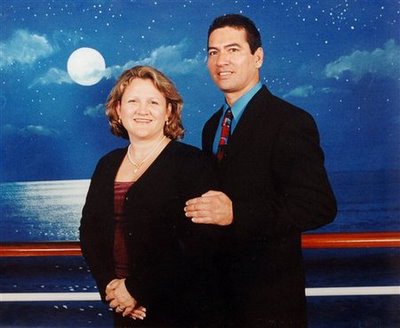
In the other case of shooting to kill, this time in America, it now turns out that the air marshals had known that the man was mentally ill:
The wife of a passenger shot dead after apparently claiming he was carrying a bomb on a plane desperately tried to tell air marshals her husband was mentally ill and had not taken his medication before they opened fire, killing him.
Passengers on board the American Airlines jetliner at Miami airport described seeing Rigoberto Alpizar, 44, run from his seat and down the aisle with his screaming wife and an undercover air marshal wearing a Hawaiian shirt in close pursuit.
"She was chasing after him," Alan Tirpak, another passenger on board, told CNN. "She was just saying her husband was sick, her husband was sick." After following him part of the way down the aisle the woman returned to her seat saying she needed to get his bags. "She just kept saying the same thing over and over, and that's when we heard the shots."
James Bauer, the agent in charge of the Federal Air Marshal Service field office in Miami, said that before Mr Alpizar ran off the plane he had "uttered threatening words that included a sentence to the effect that he had a bomb".
But several passengers, including Mike Beshears, said they did not hear Mr Alpizar say anything. "He just was in a hurry and exited the plane," he said.
Ellen Sutliff, who was sitting near Mr Alpizar, told CNN he had appeared agitated even before he boarded the plane, and that his wife, Anne, kept trying to reassure him: "We just have to get through customs ... We're going to be home soon, and everything will be all right."
Asked about the apparent discrepancy in the accounts between passengers and the air marshals, an official at the Department of Homeland Security told the Guardian that every passenger on board the plane would be interviewed. "We have to wait for the investigation, but there may be situations where what they heard would depend on where they were sitting. But the air marshals have confirmed to us that they overheard him say he had a bomb in his bag," he said.
While this case doesn't have the sinister overtones that the de Menezes case has, it still has the main background of trigger happy attendants who have been trained to shoot before asking questions. And again, the result has been that an innocent vulnerable man has lost his life as result of the panic and hysteria surrounding "terrorism".
Sun-watch: Page 3 lesbian love masquerading as news.
Just what exactly is going on over in Wapping? Has Murdoch finally decided to abandon any of the remaining news principles of the Sun and turn it into a Daily Sport-clone? Or are they just attempting to take the Zoo/Nuts route of having two naked girls pretending to be lesbians for male titillation, as after all, December is always a slow news month....
The first revelation that Becky Rule and Melanie Boorman had fallen for each other was in yesterday's Sun:
And can you guess what else they are going to do now?
Well, would you believe it? Today though the Sun went even further and published their account of their first night of passion:
So let's do a run-down for male fantasies: 2 page 3 girls kindly let us into nearly every detail of what they supposedly did; they stayed in bed all day and ordered pizza; they sleep with men as well; they love Led Zep, Stone Roses and the Cure, which should probably cover nearly every man's music taste in some way AND they enjoy gangster films. Phew!
I'm not sure it's the first time that the Sun has had a page 3 girl who has become/was a lesbian originally, as I remember that arguably the most famous page 3 girl, Samantha Fox, was/or still is living with a same-sex lover. Also of note is the way that a Page 3 girl named Rebekah Parmar Teasdale was kicked out into the cold after it was uncovered that she had done harder glamour shoots before she was recruited for Page 3, including shoots involving other girls. Interestingly, she was brought back for one day only on the arrival of the Ginger Ninja as editor, so that page 3 girl could hilariously be called "Rebekah".
Even for the Sun though this marks a further turn down-market. What Rupert Murdoch describes as a "major contribution to world class journalism" seems to be getting so desperate that it is resorting to publishing page 3 sex fantasies to increase its sale. While the world has moved on from getting angry about the Sun having topless models on its 3rd page, it's pretty depressing the lengths that the "popular" press in this country is sinking too.
Thanks to Bloggerheads for some of the sources for this, and to my brain for resisting the temptation to link the pictures.
The first revelation that Becky Rule and Melanie Boorman had fallen for each other was in yesterday's Sun:
PAGE 3 stunners Becky Rule and Melanie Boorman have something to tell their millions of male fans today: They are in love — with each other.
The gorgeous pair are the first in Page 3’s 35-year history to fall for another topless babe.
They sealed their blossoming romance during a recent Sun photoshoot on Majorca.
And can you guess what else they are going to do now?
And from now on, they will appear TOGETHER on Britain’s favourite glamour page.
Well, would you believe it? Today though the Sun went even further and published their account of their first night of passion:
LOVESTRUCK Page 3 beauties Becky Rule and Melanie Boorman have lifted the lid on their first night of lesbian lust with each other.
The busty pair got it on during a baking hot night in Majorca.
They shared a hotel room on the Spanish island during a Page 3 modelling job with four other babes.
But it took a few glasses of wine before the pair — who first met just two weeks before — finally plucked up the courage to reveal their true feelings.
Becky, 24, said: “All us Page 3 girls went for a meal on the second night of the trip. Mel and I spent the whole time flirting. She kept telling me I was her perfect woman.
“When we got back to our hotel she threw off her clothes before diving naked into the swimming pool.
“I was so excited — I just stripped and jumped in after her.”
The girls then chatted naked in a Jacuzzi with two other Page 3 babes — before Becky and Mel collapsed into bed.
Mel, 23, said: “We pushed our beds together and shared our first kiss. Then we spent the night together. It was sensual, erotic, beautiful and fun.”
Becky added: “When we got back to our hotel room after flirting in the Jacuzzi we took one look at each other and pushed our single beds together. That was when I knew for sure we both wanted to make love to each other.
“Both of us were topless and we jumped under the sheets to kiss and cuddle. But then I just couldn’t keep my hands off Mel.
“I kissed and stroked her breasts and she ran her fingers up and down my back. Then I slowly teased off her g-string and kissed her all over her body.
“Both of us were just so hot for each other. I felt like I was going to explode with desire.”
Mel, a former secretary, added: “What started off as a cuddle became much more. We just wanted each other badly.
“Our first night as lovers was perfect. I just couldn’t get enough of Becky.
“When we woke up the following morning I turned to her and said, ‘Let’s just stay in bed all day and only get up to order pizza.’ I was so happy.”
But the girls’ budding relationship took a turn — as Mel worried what her 27-year-old boyfriend would think about her new love.
She said: “Blokes always say that girl-on-girl action is their fantasy — but when it involves their girlfriend they’re not always so keen.
“I didn’t want him to think I had cheated on him and so told him about my feelings for Becky straight away.
“It was tough to begin with — but he has now accepted our relationship.
“I’m so lucky that my man understands how special she is to me.”
The two beauties had secretly fancied each other since first meeting on a photoshoot for a men’s mag.
Brunette Mel, of Morecambe, Lancs, said: “I remember the first time I laid eyes on Becky like it was yesterday.
“She had the most amazing breasts — just like a Fifties pin-up girl.
“I thought, ‘I’ve met a modern Marilyn Monroe’ and just couldn’t wait to talk to her.
“Becky was so much fun — she was flirty and outrageous.
“We chatted about boyfriend problems and laughed non-stop.”
For blonde Becky, Mel’s crystal-blue eyes and perfect rear left her spellbound.
Although she hasn’t given up on finding the perfect fella, she said: “I like girls with dark hair and blue eyes — and Mel has both. She looked like a goddess.
“But beneath that innocent look I thought there could be a cheeky minx trying to get out.
“And I couldn’t keep my eyes off her bum. It was perfect.”
The girls, who from now on will appear TOGETHER on Page 3, have both slept with women before — but there is not a shred of jealously between them.
Becky, from West London, said: “When you’re with the right woman everything falls into place.
“I slept with my best female friend on my 20th birthday and it was a good experience. You can have a real laugh with girls.”
The lusty babes — both firm favourites with our readers — have plenty in common away from the bedroom.
They love rock bands Led Zeppelin, The Stone Roses and The Cure.
And they would choose gangster films as their choice for a cosy video night in.
Becky said: “We brought out the best in each other from the start.
“Mel is so classy — she likes visiting her parents in France, skiing and going on country walks.
“I like being wined and dined but have a real bad-girl streak that makes me behave like a little devil.
“We fitted together perfectly.”
So let's do a run-down for male fantasies: 2 page 3 girls kindly let us into nearly every detail of what they supposedly did; they stayed in bed all day and ordered pizza; they sleep with men as well; they love Led Zep, Stone Roses and the Cure, which should probably cover nearly every man's music taste in some way AND they enjoy gangster films. Phew!
I'm not sure it's the first time that the Sun has had a page 3 girl who has become/was a lesbian originally, as I remember that arguably the most famous page 3 girl, Samantha Fox, was/or still is living with a same-sex lover. Also of note is the way that a Page 3 girl named Rebekah Parmar Teasdale was kicked out into the cold after it was uncovered that she had done harder glamour shoots before she was recruited for Page 3, including shoots involving other girls. Interestingly, she was brought back for one day only on the arrival of the Ginger Ninja as editor, so that page 3 girl could hilariously be called "Rebekah".
Even for the Sun though this marks a further turn down-market. What Rupert Murdoch describes as a "major contribution to world class journalism" seems to be getting so desperate that it is resorting to publishing page 3 sex fantasies to increase its sale. While the world has moved on from getting angry about the Sun having topless models on its 3rd page, it's pretty depressing the lengths that the "popular" press in this country is sinking too.
Thanks to Bloggerheads for some of the sources for this, and to my brain for resisting the temptation to link the pictures.
Thursday, December 08, 2005
No compromise on torture.
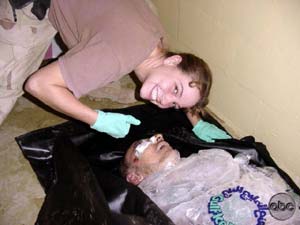
Once again we have the House of Lords to thank for saving this country from a deeply draconian ruling. The Lords today unanimously ruled that "evidence" obtained under torture is inadmissible, where-ever or whoever it was obtained from or by.
The appeal court voted last year that if evidence was obtained under torture by agents of another country with no involvement by the UK, it was usable and there was no obligation by the government to inquire about its origins.
t also means the home secretary, Charles Clarke, must re-examine all cases where evidence from abroad has been obtained by torture.
Commenting on the ruling, Mr Clarke said the government did not condone torture in any way, so the Law Lords' decision was "hypothetical".
"We accept this judgment, which will have no bearing on the government's efforts to combat terrorism: we have always made clear that we do not intend to rely on or present evidence ... which we know or believe to have been obtained by torture," he said.
The detainees, most of whom have been in custody since 2001, were held under Anti-Terrorism Crime and Security Act, which was passed soon after the September 11 attacks in the US.
With the backing of a coalition of human rights groups, they challenged a ruling by the special immigration appeals committee (SIAC) that the Home Office had "sound material" to back up the decision that they posed a threat to national security.
The panel said all eight cases should be sent back to SIAC to be reconsidered.
Lord Bingham of Cornhill, the former Lord Chief Justice who headed the panel, said English law had regarded "torture and its fruits" with abhorrence for more than 500 years.
"The principles of the common law, standing alone, in my opinion compel the exclusion of third-party torture evidence as unreliable, unfair, offensive to ordinary standards of humanity and decency and incompatible with the principles which should animate a tribunal seeking to administer justice," he said.
The human rights groups welcomed the announcement. Amnesty International, which led the coalition on the detainees' behalf, said the decision meant the government must reaffirm its ban on torture and evidence obtained by torture.
An Amnesty spokesman said: "This is a momentous decision. The Law Lords' ruling has overturned the tacit belief that torture can be condoned under certain circumstances.
"This ruling shreds any vestige of legality with which the UK government had attempted to defend a completely unlawful and reprehensible policy introduced as part of its counter-terrorism measures."
Shami Chakrabarti, the director of civil rights group Liberty, said: "This is an incredibly important day, with the Law Lords sending a signal across the democratic world that there is to be no compromise on torture.
"This is also an important message about what distinguishes us from dictators and terrorists. We will not legitimise evidence obtained by torture by using it in our justice system."
Amnesty International is now calling for an end to the deportation of alleged terror suspects to countries where they are at risk of torture.
And that is where the battle now has to be joined. There are no reasons whatsoever for why those who are at the moment detained (including Abu Qatada, who yesterday issued a message pleading for the hostages taken by the Swords of Righteousness Brigade in Iraq to be released), waiting to be deported should be not tried in this country. If they are so dangerous that they are not "conducive to the public good" we need to be told why. The government also needs to explain why they cannot be tried here. If it is because the evidence they have against them is weak, or if because the evidence they have would expose those who obtained it, then they need to admit it. The government also needs to admit whether it cannot try the men here because of the security services refusal to allow phone-tapping evidence to be used in court. Their excuse is that it would expose their measures, despite the fact that similar evidence obtained by other security services is often used in courts in other parts of the world. At the moment the public only has a rough idea of why these men are being detained, if that. Abu Rideh, one of the men believed to be detained, is seriously mentally ill and has been admitted to Broadmoor. Others are said to have suffered nervous breakdowns during their previous imprisonment without trial.
This Labour government has been economical with the truth on many previous occasions, and is using sleight of hand to deny that it condones torture in any way. Blair pleaded yesterday in the Commons that he did not know about the CIA rendition flights which have landed at airports here, despite the security services almost certainly being more than aware of what they were doing. Now that torture evidence has been ruled inadmissible, it's time for the government to admit what it knows about the CIA's kidnapping of numerous individuals across Europe, and explain its real reasons for the planned deportations to Jordan and Algeria. As Shami Chakrabarti said, it is such moral issues and ethics which separate us from the terrorists and dictatorships we are meant to be opposed to.
Wednesday, December 07, 2005
Space Cadets - In TV land, it seems no one can hear you scream.
Congratulations seem to be in order then to Channel 4 and Endemol (creators of the delightful Big Brother), who have bought adverts for their new show Space Cadets on page 1, 3, 5, 7, 9 and 11 in today's Grauniad. No doubt there are similar ads in the other papers. The premise behind Space Cadets is pretty pathetic, and not really anything new. A group of people are going to be told that after applying for a new reality tv show that they are going into near space, and are being taken to a Russian airbase for their training. The twist is that they are not of course going into space, and are in fact being tricked into going through a week or so of pointless experiments and tests. It's the kind of stunt which Jeremy Beadle and Noel Edmonds were doing a decade ago, except not on the same timescale or cost basis. The difference is that while Beadle and Edmonds were just playing tricks or winding up celebrities, similar to what Punk'd does on MTV, this is obviously a lie which is going to be played out over a long length of time in front of a cynical TV audience which following the likes of Big Brother getting evil and watching a daughter of a prime minister eating a kangaroo's penis, wants more and more sensationalism and hysteria. Of course though, this isn't a TV channel making fun of stupid, gullible people for national enjoyment, oh no. Here's how it's being defended by the shows producer:
That's alright then. While one part of me has very little sympathy for anyone who applies to be on a reality TV show, as they should know full well what they are possibly getting into, the other part thinks of the increasing dangers and long-term damage to their personal psyche as they are effectively humiliated in front of the nation for over a week. This isn't the same as Big Brother, where they can win the game or public affection by either being nice or being nasty, in this they don't have much of a choice. Still, while the show will no doubt make stars of some talentless berks, it can boast that it already has a talentless berk hosting it in Johnny Vaughn. As a lot of reality shows are hit in the ratings due to their terribleness (Celebrity Wrestling, etc) it seems that companies still can't resist commissioning such potentially dangerous tosh. Maybe they ought to take a hint from Channel 4's recent new "quiz", deal or no deal, which is all down to luck and involves genuine tension, all without hurting anybody. Then again, that's not exactly going to excite the front pages of the tabloids, is it?Several months ago, the channel advertised for "thrill seekers" to take part in a new reality TV show. A hundred applicants were invited to London for an interview before being put through a series of psychological tests to ascertain how suggestible they were.
Although the term space cadet is slang for someone who is distracted from reality, Shirley Jones, the show's executive producer, insisted the contestants were "not stupid people".
"Suggestibility is a psychological term that has no link with intelligence or gullibility. People who have a creative mind tend to be quite suggestible. All the tests we did have been done in conjunction with a psychologist," she said.
We're all going to die!
We haven't had a scare story for oh, a few days at least, so hey, let's bring back an old favourite: doom by asteriod.
So, if we're not all already dead or dying by 2036, we may well have the privilege of either being wiped out either by the after-effects of the asteriod's connection with Earth, or from the dust which will block out the sun afterwards. Quite frankly, if we're still here in 2036 and we haven't managed to come up with anything to destroy it or knock it off course by then, I personally will be adjusting the infamous poem about Slough to come friendly asteriods and fall on Earth.
In Egyptian myth, Apophis was the ancient spirit of evil and destruction, a demon that was determined to plunge the world into eternal darkness.
A fitting name, astronomers reasoned, for a menace now hurtling towards Earth from outerspace. Scientists are monitoring the progress of a 390-metre wide asteroid discovered last year that is potentially on a collision course with the planet, and are imploring governments to decide on a strategy for dealing with it.
Nasa has estimated that an impact from Apophis, which has an outside chance of hitting the Earth in 2036, would release more than 100,000 times the energy released in the nuclear blast over Hiroshima. Thousands of square kilometres would be directly affected by the blast but the whole of the Earth would see the effects of the dust released into the atmosphere.
And, scientists insist, there is actually very little time left to decide. At a recent meeting of experts in near-Earth objects (NEOs) in London, scientists said it could take decades to design, test and build the required technology to deflect the asteroid. Monica Grady, an expert in meteorites at the Open University, said: "It's a question of when, not if, a near Earth object collides with Earth. Many of the smaller objects break up when they reach the Earth's atmosphere and have no impact. However, a NEO larger than 1km [wide] will collide with Earth every few hundred thousand years and a NEO larger than 6km, which could cause mass extinction, will collide with Earth every hundred million years. We are overdue for a big one."
Apophis had been intermittently tracked since its discovery in June last year but, in December, it started causing serious concern. Projecting the orbit of the asteroid into the future, astronomers had calculated that the odds of it hitting the Earth in 2029 were alarming. As more observations came in, the odds got higher.
Having more than 20 years warning of potential impact might seem plenty of time. But, at last week's meeting, Andrea Carusi, president of the Spaceguard Foundation, said that the time for governments to make decisions on what to do was now, to give scientists time to prepare mitigation missions. At the peak of concern, Apophis asteroid was placed at four out of 10 on the Torino scale - a measure of the threat posed by an NEO where 10 is a certain collision which could cause a global catastrophe. This was the highest of any asteroid in recorded history and it had a 1 in 37 chance of hitting the Earth. The threat of a collision in 2029 was eventually ruled out at the end of last year.
Alan Fitzsimmons, an astronomer from Queen's University Belfast, said: "When it does pass close to us on April 13 2029, the Earth will deflect it and change its orbit. There's a small possibility that if it passes through a particular point in space, the so-called keyhole, ... the Earth's gravity will change things so that when it comes back around again in 2036, it will collide with us." The chance of Apophis passing through the keyhole, a 600-metre patch of space, is 1 in 5,500 based on current information.
So, if we're not all already dead or dying by 2036, we may well have the privilege of either being wiped out either by the after-effects of the asteriod's connection with Earth, or from the dust which will block out the sun afterwards. Quite frankly, if we're still here in 2036 and we haven't managed to come up with anything to destroy it or knock it off course by then, I personally will be adjusting the infamous poem about Slough to come friendly asteriods and fall on Earth.
Tuesday, December 06, 2005
Time is running out.
New maps show that the Earth is rapidly running out of fertile land and that food production will soon be unable to keep up with the world's burgeoning population. The maps reveal that more than one third of the world's land is being used to grow crops or graze cattle.
Scientists at the University of Wisconsin-Madison combined satellite land cover images with agricultural census data from every country in the world to create detailed maps of global land use. Each grid square was 10 kilometres (6.2 miles) across and showed the most prevalent land use in that square, such as forest, grassland or ice.
"In the act of making these maps we are asking: where is the human footprint on the Earth?" said Amato Evan, a member of the University of Wisconsin-Madison research team presenting its results this week at a meeting of the American Geophysical Union in San Francisco.
The current map shows a snapshot of global land use for the year 2000, but the scientists also have land use data going back to 1700, showing how things have changed.
"The maps show, very strikingly, that a large part of our planet (roughly 40%) is being used for either growing crops or grazing cattle," said Dr Navin Ramankutty, a member of the Wisconsin-Madison team. By comparison, only 7% of the world's land was being used for agriculture in 1700.
The Amazon basin has seen some of the greatest changes in recent times, with huge swaths of the rainforest being felled to grow soya beans.
"One of the major changes we see is the fast expansion of soybeans in Brazil and Argentina, grown for export to China and the EU," said Dr Ramankutty.
This agricultural expansion has come at the expense of tropical forests in both countries.
Meanwhile, intensive farming practices mean that cropland areas have decreased slightly in the US and Europe and the land is being gobbled up by urbanisation.
The research indicates that there is now little room for further agricultural expansion.
"Except for Latin America and Africa, all the places in the world where we could grow crops are already being cultivated. The remaining places are either too cold or too dry to grow crops," said Dr Ramankutty.
It's time that we stopped kidding ourselves. We are living beyond our means. Unless we drastically cut back on what we are doing, then a harsh future may await us, let alone our offspring. As population levels continue to rise, although they are more or less static in the majority of Europe, more and more power is being consumed, our resources are being exploited, and our heritage is being wrecked.
We have to face up to this now. We are may not want to abandon our lifestyles which revolve around the economic orthodoxy of constant growth, its foundation in neo-classical theory, but unless we do then it already may be too late. Global warming is accelerating and looking to have already an even higher bigger effect on the weather than was predicted. We also cannot rule out nuclear power, whatever our feelings about it. At the moment there is no consensus on moving towards a system of true-cost economics, which measures the damage we are doing to the environment and what resources we are using, as well as the improvements to life in general. We can no longer rely on GDP as a measure of how well a society is working. If we are not careful, catastrophe could be here quicker than we imagine.
Cameron becomes new Tory leader - now he has to prove he is a new Tory.
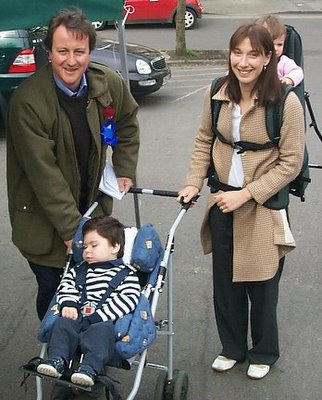
David Cameron has then rather unsurprisingly become the new Tory leader -- beating David Davis by a margin of over 2 to 1 in a ballot of Conservative party members.
The race for the leadership was itself around as exciting as today's amazing tabloids revelations that Gazza likes a drink. Apart from the smear campaign that Cameron suffered following his conference speech over drugs, the race itself was almost entirely deviod of any serious political positions or policy statements. Instead it focused mostly on their different backgrounds, with Davis covering himself in an England flag as he told his tale of growing up on a council estate. Cameron tried to play down his somewhat privileged background, having attended Eton, and did somewhat succeed, although whether Tory voters cared about that or not is debatable.
Cameron now finds himself at the helm of a party with a 3 time losing streak. The last two of those elections were decided on Labour's economic record and the focus on the Tories still being the nasty and outdated party, focused on Europe and anti-immigrant fervour, with tax cuts which would have devastated the public services announced at the last minute.
Cameron himself, in the few policy moments which were announced or discussed, especially in his two question times appearances, did come across as engaging, charismatic and charming. I personally found myself disagreeing with him mostly, but I still respected his positions. The last person who has been credited with having such an effect on people was Tony Blair in his early years of Labour leadership. Cameron has already got a head-start on the drugs policies, as there is no way he could now came out with a clampdown as his past has been exposed. In fact, his drug policies seem saner than the Labour parties. He was on the committee which recommended that Ecstacy should be downgraded to a Class B drug, as it is undoubtedly nowhere near as dangerous as heroin or crack, and has few addictive qualities. He has promised to move the party towards the centre, making the Tories once again a challenge to Labour, and in the process revitalising democratic debate in a country which has come close to being a one party state under Tony Blair's direction. The defeat on the 90 day terror proposals has ended that, and Cameron should further undermine Blair's already lingering hold on power. The crunch may come with the education proposals to be published and legislated on in the new year.
This is where Cameron has to prove that he is different to the leaders that have gone before him. While Hague, Duncan Smith and Howard have all pledged to return to the centre and be "compassionate", they have instead drifted further and further towards the right, culminating in one of the nastiest and xenophobic election campaigns in years. Cameron has already suggested that he will support measures on which he supports the government, and not give in to knee-jerk opposition. That could well be his first mistake. While he may not want to be associated with helping the Labour left in defeat the government over Education, the facts of the matter are that the Tories want to go even further over Ruth Kelly's deeply flawed white paper. If Cameron is to prove that he really wants power, then he should oppose the government on when he thinks they are wrong, as they are on education at the moment. Whether they wish to go further or not is moot.
Cameron should also not abandon the Tory party's new found love of civil liberties, in opposing the government's draconian terrorism legislation, as well as the deeply hated ID Cards scheme. While there were more than distant murmurings from some backbench Tories over their position on the 90 days possible detention, he should recognise that true conservatism would involve keeping our hard-fought for the freedom, not diluting it and helping those who wish us harm claim victory. Another position that a new Tory leader would be embrace would be green issues and the environment - something that Labour is starting to fail badly on. Surely a conservative party would want to stop the country from being both being completely urbanised, and help improve the dire transport network. A good start would be to announce that the Tories would improve public transport, something which Labour pledged to do but which it has forgotten about. Also equally important would be measures that set out clearly what percentage of emissions the country can emit, and stick to them without buying so-called "credits" from abroad.
Cameron would also do well to listen to Iain Duncan Smith's thinktank, which has focused on helping the inner cities and not on the upper middle class which the party is obsessed with. Unfortunately, Cameron's PR past and his relations with big business show little sign that he will be tough on corporate excesses.
Cameron then is faced with a party that he has to shake into looking forward, while not forgetting the lessons of the past. Whether he will succeed remains to be seen, but politics may once again become something more than Labour announcing what they are going to do and then steam rolling it through parliament.
The race for the leadership was itself around as exciting as today's amazing tabloids revelations that Gazza likes a drink. Apart from the smear campaign that Cameron suffered following his conference speech over drugs, the race itself was almost entirely deviod of any serious political positions or policy statements. Instead it focused mostly on their different backgrounds, with Davis covering himself in an England flag as he told his tale of growing up on a council estate. Cameron tried to play down his somewhat privileged background, having attended Eton, and did somewhat succeed, although whether Tory voters cared about that or not is debatable.
Cameron now finds himself at the helm of a party with a 3 time losing streak. The last two of those elections were decided on Labour's economic record and the focus on the Tories still being the nasty and outdated party, focused on Europe and anti-immigrant fervour, with tax cuts which would have devastated the public services announced at the last minute.
Cameron himself, in the few policy moments which were announced or discussed, especially in his two question times appearances, did come across as engaging, charismatic and charming. I personally found myself disagreeing with him mostly, but I still respected his positions. The last person who has been credited with having such an effect on people was Tony Blair in his early years of Labour leadership. Cameron has already got a head-start on the drugs policies, as there is no way he could now came out with a clampdown as his past has been exposed. In fact, his drug policies seem saner than the Labour parties. He was on the committee which recommended that Ecstacy should be downgraded to a Class B drug, as it is undoubtedly nowhere near as dangerous as heroin or crack, and has few addictive qualities. He has promised to move the party towards the centre, making the Tories once again a challenge to Labour, and in the process revitalising democratic debate in a country which has come close to being a one party state under Tony Blair's direction. The defeat on the 90 day terror proposals has ended that, and Cameron should further undermine Blair's already lingering hold on power. The crunch may come with the education proposals to be published and legislated on in the new year.
This is where Cameron has to prove that he is different to the leaders that have gone before him. While Hague, Duncan Smith and Howard have all pledged to return to the centre and be "compassionate", they have instead drifted further and further towards the right, culminating in one of the nastiest and xenophobic election campaigns in years. Cameron has already suggested that he will support measures on which he supports the government, and not give in to knee-jerk opposition. That could well be his first mistake. While he may not want to be associated with helping the Labour left in defeat the government over Education, the facts of the matter are that the Tories want to go even further over Ruth Kelly's deeply flawed white paper. If Cameron is to prove that he really wants power, then he should oppose the government on when he thinks they are wrong, as they are on education at the moment. Whether they wish to go further or not is moot.
Cameron should also not abandon the Tory party's new found love of civil liberties, in opposing the government's draconian terrorism legislation, as well as the deeply hated ID Cards scheme. While there were more than distant murmurings from some backbench Tories over their position on the 90 days possible detention, he should recognise that true conservatism would involve keeping our hard-fought for the freedom, not diluting it and helping those who wish us harm claim victory. Another position that a new Tory leader would be embrace would be green issues and the environment - something that Labour is starting to fail badly on. Surely a conservative party would want to stop the country from being both being completely urbanised, and help improve the dire transport network. A good start would be to announce that the Tories would improve public transport, something which Labour pledged to do but which it has forgotten about. Also equally important would be measures that set out clearly what percentage of emissions the country can emit, and stick to them without buying so-called "credits" from abroad.
Cameron would also do well to listen to Iain Duncan Smith's thinktank, which has focused on helping the inner cities and not on the upper middle class which the party is obsessed with. Unfortunately, Cameron's PR past and his relations with big business show little sign that he will be tough on corporate excesses.
Cameron then is faced with a party that he has to shake into looking forward, while not forgetting the lessons of the past. Whether he will succeed remains to be seen, but politics may once again become something more than Labour announcing what they are going to do and then steam rolling it through parliament.
Monday, December 05, 2005
Rice: see no evil, hear no evil, speak no evil.

Did anyone really expect her to admit to what is becoming more and more obvious by the day though?
The US secretary of state, Condoleezza Rice, has defended US treatment of terror suspects and refused to either confirm or deny the existence of CIA-run secret prisons in eastern Europe.
Ms Rice said European countries should trust the US because information gathered by the CIA had "prevented terrorist attacks in Europe ... and other countries".
She added that the US would use "every lawful weapon to defeat these terrorists".
Reading out a statement at Andrews air force base in Maryland before leaving on a trip to Europe, Ms Rice said: "We cannot discuss information that would compromise the success of intelligence, law enforcement, and military operations. We expect other nations share this view."
"The US does not use the air space or airport of any country for the purpose of transporting a detainee when we believe he or she will be tortured," she said.
"The United States does not transport, and has not transported, detainees from one country to another for the purpose of interrogation using torture."
Ms Rice then needs to explain why so many chartered CIA-flights have made numerous stop-offs in countries all over Europe. She needs to explain why these planes stopped where they did, who was on board and where their end destination was. Of course, she already said that can't as she won't discuss anything that could compromise the success of their intelligence.
This "intelligence" led to the kidnapping, sorry, I mean, principled abduction, um regrettably necessary taking of suspected terrorists by the CIA of those who happen to share the same name. This, according to the Washington Post, happened to Khaled Masri, who was taken in Germany and flown to Afghanistan, most likely to Bagram airbase. He was kept in appalling conditions for five months before he was taken back home. Many other similar cases are suspected, as well as those who suspect that numerous innocent men are being imprisoned at Guantanamo Bay.
Maybe we shouldn't be too hard on the woman with an oil tanker named after her. After all, as she also stated in her speech, it's very true that rendition has been practised for decades, since the late 1980s at least. Rendition is also remarkably similar to what Blair and Clarke are planning to do with the former Belmarsh prisoners who were on control orders and are now back in prison awaiting deportation. The difference is the government has attempted to make sure that they won't be tortured back in their home climates of Jordan and Algeria. The reality is that such assurances are worthless and the government is only seeking them so that it is not breaking EU law.
It's also true that our own intelligence agencies are entirely complicit in the actions of the CIA. The security services have visited Guantanamo bay, and have done nothing about the remaining nominally-British suspects that remain there. The government and intelligence services have relied on information given them by the torturers of Uzbekistan, as documented by Craig Murray. The government also well knows about the CIA flights; especially seeing as they have landed at military airbases. Their denials and Straw's comical speaking up, just to be seen as doing something are hypocritical and laughable.
What really may come back to haunt Rice though is her two unequivocal statements that the US does not connive in torture in any way. This is an obviously intelligent woman who has high aspirations, maybe to even being President. Some are certainly grooming her for a run. Why then has she made two statements which may prove the breaking of her? Both are undoubtedly bold faced lies. Dick Cheney himself is trying to alter the law recently passed by Congress which made "cruel, inhuman and degrading" treatment of detainees illegal by having the CIA exempted? What further proof is needed? That the US is using friendly middle-eastern countries to do its dirty work, or prisons in "New Europe" is bad enough. When the truth is right under Ms Rice's nose, and she denies everything in her see no evil style, it really does make you wonder just where all this is heading.
Sun-watch: Asking the bleeding obvious.

Because they did something silly and stupid, that's why. Not to sound cruel or uncompassionate, but these girls crossed a railway line when the signal was that a train was coming. More than that, it was travelling at 70mph, not at 100 or more as some trains do. They could, and should have seen it. However, as people increasingly look to blame others for their own mistakes, it is the rail authorities and government which increasingly gets it in the neck.
The Guardian covers the story in a less histrionic fashion, and does suggest that the accident could and should have been prevented by a better safety scheme, such as an overpass across the track. It doesn't take away from the facts that the girls still should not have attempted to cross the track, even if the theory that they thought the warnings were for the train they wanted to board is correct or not. The Sun's front page suggests that others are culpable. From a newspaper that considers itself an enemy of political correctness, it is highly hypocritical for it to suggest that the girls' deaths are anyone else's fault. Consider a similar story: someone walks too close to the edge of a cliff, slips and falls down. His family then blame the local authority for not putting up a fence or signs warning of the dangers. Who would you agree with?
Saturday, December 03, 2005
Quote of the week.
"The President strongly supports the death penalty because he believes ultimately it helps save innocent lives." - Scott McClellan, White House spokesperson.
Torture still widespread in China.
It's good to know that one of the countries which is increasingly making more and more business deals with western companies and contributing to the kleptocracy which operates in both China and the US is actually becoming such a beacon for human rights:
I find it really sickening how increasingly cosy relations are getting between the Chinese and other nations and companies. This is a country which is no longer in any way Communist - which is what it claims. It is rather a fascistic ultra-capitalist state where dissent is managed on the internet by blocking numerous sites and words, and where nationalist sentiment is riled up by cadres of the party, most recently seen against Japan. It shows no signs whatsoever of giving in to some vestiges of democracy, and has cracked down brutally on peasant movements and against those who refuse to have their land taken from them for industry. In short then, it's a dream for most business - little regulation, low taxes and low pay for the workers.
China does however have a huge number of rural poor. While the middle classes in the major cities are engaged in an orgy of consumerism and greed, those outside them increasingly find themselves being swept into destitution. It is they who have the power to change China's direction. The question is when or if they will awaken from their slumber. If they don't, then it looks increasingly like we will have an emerging world power that makes the Soviet Union look like a beacon for prosperity and hope.
Immersion in sewage, ripping out fingernails, sleep deprivation, cigarette burns and beatings with electric prods - these are some of the torture methods used by China's police and prison officers to extract confessions and maintain discipline, a United Nations investigation has found.
Manfred Nowak, the UN special rapporteur on torture, said yesterday that abuse of suspects and prisoners remained widespread in China. Treatment was far worse than international norms, despite recent signs of improvement.
Mr Nowak's investigation was the first ever permitted by China and, as such, represents a breakthrough in human rights. Despite this, he said he had been obstructed by security officials, who intimidated some victims and their relatives or prevented them from seeing him.
However, he was able to visit prisons, detention centres and "re-education" labour camps in Beijing and the troubled regions of Xinjiang and Tibet, as well as interviewing academics, justice officials and detainees. Among the prisoners, Mr Nowak said he observed a "palpable level of fear and self-censorship", which he had not seen in missions to other countries.
Human rights groups say brutality and degradation are common in Chinese prisons, where many of the victims are from the Tibetan and Uighur ethnic minorities, political dissidents, followers of the banned Falun Gong sect and members of underground churches.
Although China outlawed torture in 1996, its definition of illegal acts - those leaving physical marks - is so narrow that interrogators can employ a wide range of methods contravening UN standards. Suspects are manacled in contorted positions, deprived of sleep and subjected to psychological torture. Some techniques have been given names, such as "reversing an aeroplane", where a victim must remain standing, bent double, with arms splayed upwards and backwards.
I find it really sickening how increasingly cosy relations are getting between the Chinese and other nations and companies. This is a country which is no longer in any way Communist - which is what it claims. It is rather a fascistic ultra-capitalist state where dissent is managed on the internet by blocking numerous sites and words, and where nationalist sentiment is riled up by cadres of the party, most recently seen against Japan. It shows no signs whatsoever of giving in to some vestiges of democracy, and has cracked down brutally on peasant movements and against those who refuse to have their land taken from them for industry. In short then, it's a dream for most business - little regulation, low taxes and low pay for the workers.
China does however have a huge number of rural poor. While the middle classes in the major cities are engaged in an orgy of consumerism and greed, those outside them increasingly find themselves being swept into destitution. It is they who have the power to change China's direction. The question is when or if they will awaken from their slumber. If they don't, then it looks increasingly like we will have an emerging world power that makes the Soviet Union look like a beacon for prosperity and hope.
Thursday, December 01, 2005
Fuck Christmas.

Today is the 1st of December. As I walked along the street earlier, one person greeted a friend by saying "Merry Christmas!". He wasn't being ironic. They were putting the Christmas trees up on the buildings around the town as well, ready to light them up with the gaudy lights that for around a month illuminate the night sky, before we pack them away for another year.
As a child, I didn't celebrate Christmas, thanks to my parents religious beliefs. Maybe that's why I've come to hate this time of year. Maybe it's because of the way a single day has become hyped up into being the ultimate day of fun, joy and family harmony. We base the whole day around the myth of a man who comes down the chimney to deliver presents to the good little children of the world. Others will remind us that it's about the birth of a savior, a child that would light up the whole world and give hope to those everywhere.
In reality, the day has long since lost any meaning. Some shopping malls have had their decorations up since the beginning of November. To many, Christmas is when the businesses make their biggest profits, as parents splash their cash on little Junior and give into his ever whim. The reality of this is that most will put it all on their credit cards and forget about it, or at least try to. It's no wonder that the country is facing a crisis over the huge amount of people with negative equity.
Away from the spending, we are engulfed with songs by one hit wonder bands that we never heard of again. It's the same stuff every year, played and then retired. The adverts on TV also start around mid-November time. This year we're being encouraged by Kerry Katona to spend spend spend at Iceland. Tesco, with their arrogant rubbing your nose in it mentality continue to awash the screens with numerous adverts for various products, voiced by feckless celebrities who take the cash and saying nothing else. Then there's Coca Cola, back with another retake of their infamous "holidays are coming" Coke truck adverts, with Santa at the end swigging back a bottle of the sugary brown liquid.
Christmas fills me with misery. It may be because I'm a sour little pessimistic asshole, who can only ever see the glass as half empty instead of half full, but I detest this season with a passion. It's so fake. It leaves those lonely and depressed even more upset with the way their luck has gone rotten. It takes the poor and forces them to lie to their children who don't know any better that they will spend what they can't afford on presents. It takes the country for a month and forces it smile, whether it wants to or not. Those who don't get into the spirit for whatever reason are cast out. Yet every year it gets longer and longer and more drawn out. The build-up intensifies. Nevermind that nearly every Christmas day numerous families break apart as arguments take place and children rebel. Nevermind that all meaning has been stripped away and that it has become a celebration of capitalism and greed and nothing more. Nevermind that it ignores the plight of those forgotten. Nevermind that it makes vast silent majorities of the public deeply uncomfortable. Just think of the children and the joy on their little faces as they open their gifts, eat their turkey and as the family glows with happiness at their perfect little nuclear world.
Maybe I'm wrong. Maybe I'm just sad that my childhood wasn't like that. Maybe I'm sad that I feel deeply alone. Whether it's the former or the latter, fuck christmas.
Pentagon paying for articles in Iraqi media.
I'm surprised that this hasn't been exposed sooner:
Well, I suppose this is the lighter option to bombing al-Jazeera. With Baghdad now quite possibly the most dangerous place on the planet though, is their money actually doing any good? Following the revelations over prisoner abuse by the majority Shia over Sunni prisoners, the mood has turned even more downcast. Reports suggesting that the Kurds have independently struck a deal with the Norwegians over oil-drilling are unlikely to help matters. While many doom-sayers have for months now been saying that civil war is if not already underway, then just around the corner, the signs on the ground are that it is still not likely.
I can't really tell what the US wants in Iraq anymore. Their plans for staying until "victory is complete" runs with their wanting to maintain numerous bases in Iraq. However, the emergence of the Shia as such a political force was certainly not what was wanted, especially as problems over Iran intensify. It seems increasingly likely that Iraq is going to split, whether down to civil war or not. With the Sunnis left with only the desert Anbar province, you can bet that the Sunni-led insurgency will carry on for years to come. Also expect the US to justify permanently staying because the Anbar province will be used by "terrorists" for planning attacks on America. If the above happens, it could really be the most disastrous war for America since Vietnam.
Faced with suicide bombings, claims of Iraqi death squads, and kidnappings, the Pentagon has come up with an innovative solution to solving the problems in Iraq: buying good news. Using defence contractors or intermediaries posing as freelance reporters, the military has been paying Iraqi newspapers to publish stories written by a military propaganda unit lauding the US mission.
According to the Los Angeles Times, the articles are translated into Arabic and placed in Baghdad newspapers where they are often presented as unbiased accounts by independent journalists. Records obtained by the newspaper indicate the US has paid to publish dozens of articles since the operation began this year, with headlines such as "Iraqis insist on living despite terrorism" and "more money goes to Iraq's development".
One military official told the LA Times the military has also bought an Iraqi newspaper and taken control of a radio station, both used to channel pro-American messages. The propaganda offensive is said to have caused unease among some senior military officials at the Pentagon and in Iraq, especially when the US is promising to promote democratic principles.
Well, I suppose this is the lighter option to bombing al-Jazeera. With Baghdad now quite possibly the most dangerous place on the planet though, is their money actually doing any good? Following the revelations over prisoner abuse by the majority Shia over Sunni prisoners, the mood has turned even more downcast. Reports suggesting that the Kurds have independently struck a deal with the Norwegians over oil-drilling are unlikely to help matters. While many doom-sayers have for months now been saying that civil war is if not already underway, then just around the corner, the signs on the ground are that it is still not likely.
I can't really tell what the US wants in Iraq anymore. Their plans for staying until "victory is complete" runs with their wanting to maintain numerous bases in Iraq. However, the emergence of the Shia as such a political force was certainly not what was wanted, especially as problems over Iran intensify. It seems increasingly likely that Iraq is going to split, whether down to civil war or not. With the Sunnis left with only the desert Anbar province, you can bet that the Sunni-led insurgency will carry on for years to come. Also expect the US to justify permanently staying because the Anbar province will be used by "terrorists" for planning attacks on America. If the above happens, it could really be the most disastrous war for America since Vietnam.
About
- This is septicisle
Links
- Bloggerheads
- The Sun - Tabloid Lies
- Liberal Conspiracy
- Lenin's Tomb
- D-Notice
- Daily Mail/Express Watch
- Councillor Bob Piper
- Craig Murray
- Comment is Free
- Rachel from North London
- Straight to the Point
- Paul Linford
- The Ministry of Truth
- Mask of Anarchy
- Osama Saeed - Rolled-up Trousers
- Pickled Politics
- Stop the BNP
- Post Hegemony
- George Monbiot
- Melon Farmers
- Jews Sans Frontieres
- Blood & Treasure
- Five Chinese Crackers
- Chicken Yoghurt
- tygerland.net
- Action on Rights for Children
- Jailhouselawyer
- Nosemonkey
- Between the Hammer and the Anvil
- Mr Eugenides
- Tampon Teabag
- Retired Rambler
- Politaholic
- Stumbling and Mumbling
- Ten Percent
- Iraq Dossier - Blog
- Bill's Comment Page
- Mike Power
- Unrepentant Communist
- A Very Public Sociologist
- Though Cowards Flinch
- Socialist Unity
- Dave's Part
- Shiraz Socialist
- Leftwing Criminologist
- Through the Scary Door
- Dirty Leftie
- Konichiwa, Bitches
- Eric the Fish
- Mad Ranter
- Qwghlm
- Chris Paul - Labour of Love
- Capital D
- Sim-O's Random Thoughts
- Mediawatchwatch
- Never Trust a Hippy
- Pigdogfucker
- Rhetorically Speaking
- Enemies of Reason
- Griffindor - Lee Griffin
- Bleeding Heart Show
- Hopi Sen
- Transform
- anticant
- Love and Garbage
- Cynical Dragon
- Tory Troll
- Wardman Wire
- The Daily (Maybe)
- The Curmudgeon
- Greenman's Occasional Organ
- Freemania
- openDemocracy - OurKingdom
- Penny Red
- Yorkshire Ranter
- Dave Cole
- Heresy Corner
- Back Towards The Locus
- Daily Quail
- Spy Blog
- Alix Mortimer
- Scribo Ergo Sum
- Westminster Wisdom
- Robert Sharp
- John B
- Angry Mob
- Blurred Clarity
- Hagley Road to Ladywood
- No Sleep 'Til Brooklands
- Stirring Up Apathy
- Tabloid Watch
- The Lay Scientist
- Next Left
- Third Estate
- Sadie's Tavern
- Don Paskini
- Harpymarx
- Splintered Sunrise
- The Polemical Report
- Bad Science
- Pavlov's Cat
- Forced to die alone and without dignity.
- The Liberal Democrat dilemma.
- Boycotting boycotts.
- Social networking refuseniks.
- Eliza Manningham-Bullshitter.
- The electoral war over crime.
- Ricin you say? Oh, he's white, we're not interest...
- Venables, anonymity and tabloid retribution part 3...
- Blair before Brown.
- Venables, anonymity and tabloid retribution part 2...
- July 2005
- August 2005
- September 2005
- October 2005
- November 2005
- December 2005
- January 2006
- February 2006
- March 2006
- April 2006
- May 2006
- June 2006
- July 2006
- August 2006
- September 2006
- October 2006
- November 2006
- December 2006
- January 2007
- February 2007
- March 2007
- April 2007
- May 2007
- June 2007
- July 2007
- August 2007
- September 2007
- October 2007
- November 2007
- December 2007
- January 2008
- February 2008
- March 2008
- April 2008
- May 2008
- June 2008
- July 2008
- August 2008
- September 2008
- October 2008
- November 2008
- December 2008
- January 2009
- February 2009
- March 2009
- April 2009
- May 2009
- June 2009
- July 2009
- August 2009
- September 2009
- October 2009
- November 2009
- December 2009
- January 2010
- February 2010
- March 2010
